Craig Cliff's Blog, page 12
June 8, 2017
Flame out/flame on: Fortnights 8 & 9 of The Burns
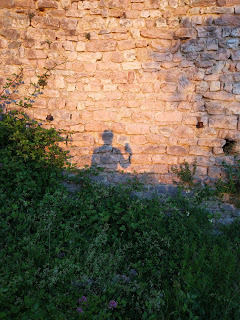 Self-portrait, AssisiFortnight 8 (8-21 May)
Self-portrait, AssisiFortnight 8 (8-21 May)Total words: 9,781 (1st week: 5,897; 2nd: 3,884)
Breakdown: Novel 1,903, Blog/essays 5,898, Poetry 1,980
Fortnight 9 (22 May - 4 June)
Total words: 0
So, I left for Italy on 20 May and got back to NZ on 4 June, which explains the goose egg for Fortnight 9. I actually wrote about 5,000 words of notes while on my research roadtrip and took over a 1000 photos/videos, so it was quite productive, but it was a slip back into Pre-Production rather than time spent in Principle Photography, as they say in the movie business, so I'm happy to call it 'zero' and reap the rewards of massive and intimidating wordcounts in subsequent fortnights (not to jinx anything).
As for Fortnight 8, there was the Dunedin Writers Festival, which involved some prep and some poetry on my part, which I wrote about in part here. And prep for my Italy trip, which meant there wasn't a lot of time (or headspace) to push the novel forward.
-
What to say about Italy?
I don't want to say much, because I want to funnel most of it into my novel (or its first draft). But I will say I found the question of sharing my journey on social media was a fraught one.
There's the temptation to share pictures and videos to make people eat their smartphones in jealousy. This is doubly so when you see others doing it while you're travelling.
But my trip is so much more interesting that yours!
But my meal was so much more epic!
My driving in Italy story so much funnier (and better told)!
But, of course, the reality of travel, especially solo travel for a specific, work-related purpose, isn't all jealousy inducing. There's all those meals alone (and the orders you regret: walnuts? walnuts!). The relentless mental load of getting all the places you need to get under your own steam. And the fact Italy can be a frustrating, backwards, unfriendly fucking place at the best of times. But it's easier to share the sunset shots, the flashmob in the Pantheon that gave you chills, the humblebrags about how many km's you've carved out and leave the static schmucks back home to slowly pickle in their own bile.
And with that, some pics...
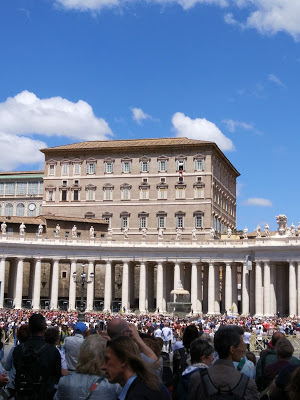 Papa Francesco addressing us at the Vatican
Papa Francesco addressing us at the Vatican
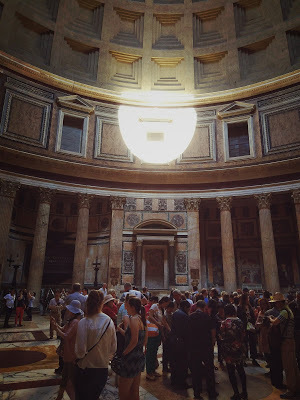 The Pantheon
The Pantheon 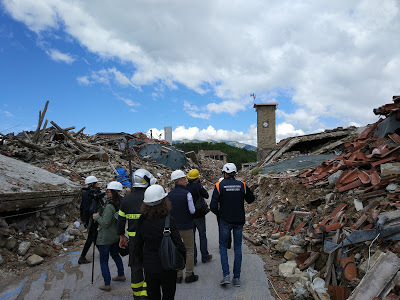 Amatrice
Amatrice 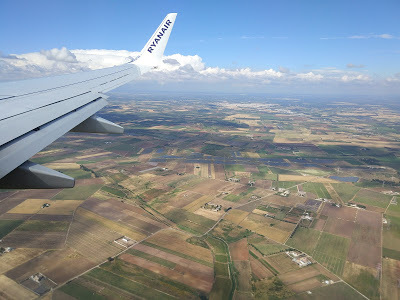 Flying into Brindisi
Flying into Brindisi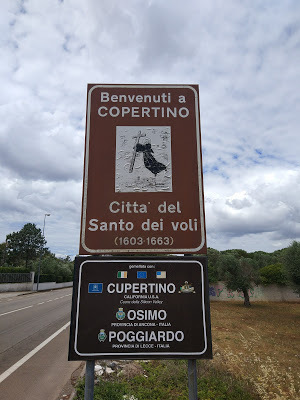
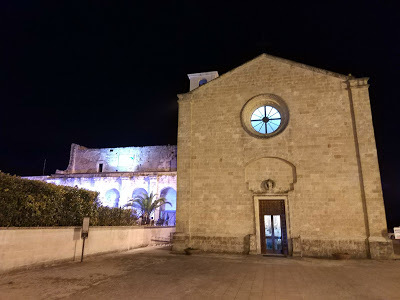 Santa Maria della Grottella, Copertino
Santa Maria della Grottella, Copertino Driving to Martina Franca
Driving to Martina Franca Montescaglioso
Montescaglioso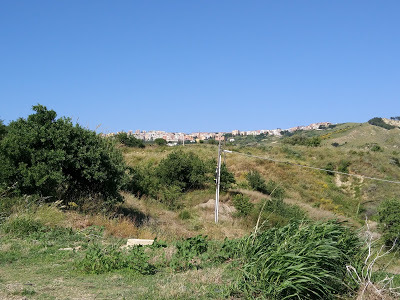 Altamura
Altamura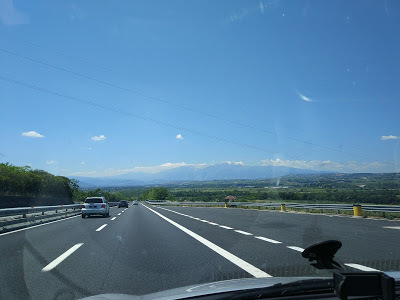 Driving the A14
Driving the A14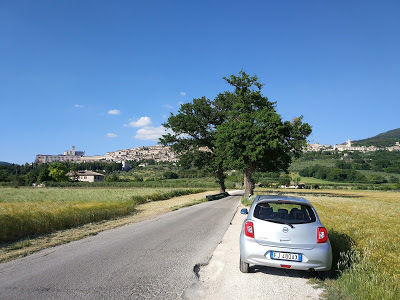 My Nissan Micra for the week, approaching Assisi
My Nissan Micra for the week, approaching Assisi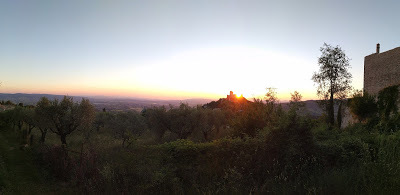 Assisi
Assisi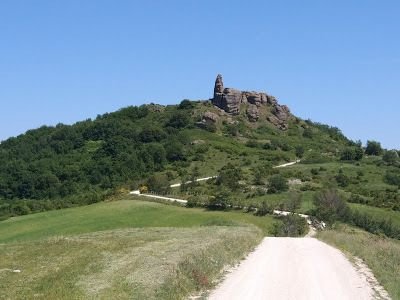 Pietrarubbia
Pietrarubbia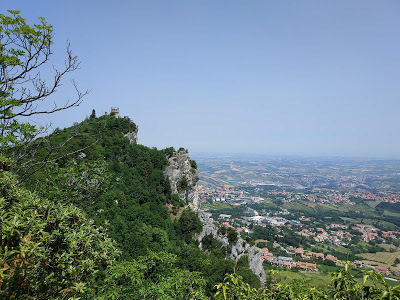 San Marino
San Marino San Giuseppe da Copertino taking flight
San Giuseppe da Copertino taking flight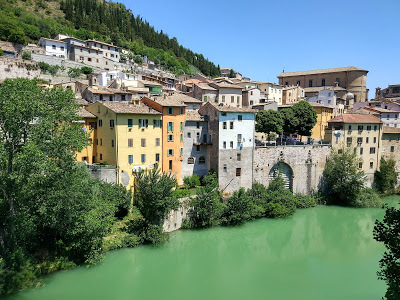 Fossombrone
Fossombrone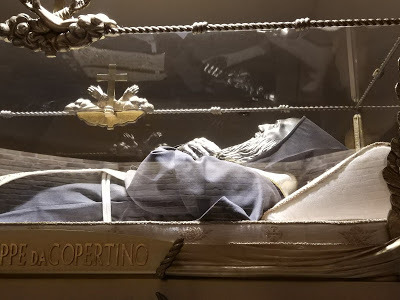 The tomb of San Giuseppe, Osimo
The tomb of San Giuseppe, Osimo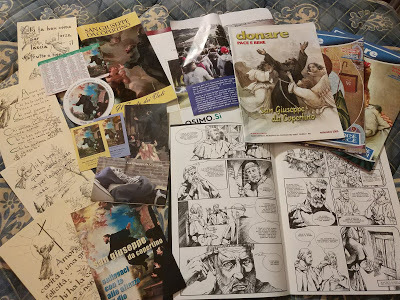 My haul (Fossombrone and Osimo)
My haul (Fossombrone and Osimo)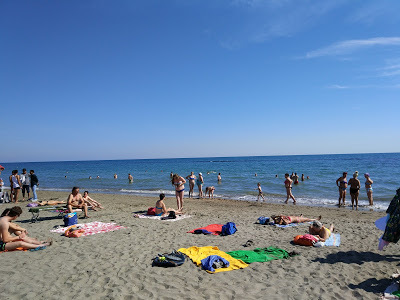 Lido di Ostia
Lido di Ostia
Published on June 08, 2017 15:17
May 18, 2017
Something to say
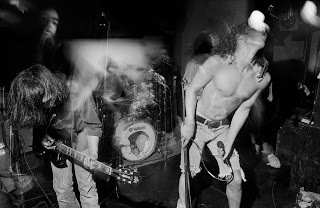
Nothing to say
I sing when I’m at home. In the shower. While I cook dinner. Always badly, but I sing.
My kids, even though they’ve grown up with my constant singing, know it’s terrible and often tell me to stop. When I run the bath — which I do every night for three minutes of solitude after the rush of cooking for, and struggling to feed, my treasured monsters — I sing. There’s no one there to yell ‘stop’ or throw hands over their ears. The acoustics aren’t quite as good as the shower, but I can forget how bad I sound with the bath filling and sing in the style of people in their twenties when I was a pre-teen.
For the last three weeks I’ve been singing ‘Nothing to Say’. I’m not sure how this earworm worked its way into my repertoire in the autumn of 2017, but it was kinda funny, the way it fell just short of being ironic, that in this year of being paid to write whatever I wanted, I kept telling the bathtub I had nothing to say. I thought about writing about it. About how this song, through a quirk of musical availability in the pre-internet world, had started something.
But I didn’t write it after the first week, or the second. And then this morning I learnt Chris Cornell had killed himself in his hotel room in Detroit. Had ended his life mere hours after a Soundgarden show.
And I thought: ‘Shit, fuck, Christ.’
After a little while, I also thought, ‘Shit, I can’t write that thing anymore.’
Because I never wrote about Bowie or Scott Weiland when they died.
Because there’s something so fucked about colonising the death of someone you’ve admired from a distance with your personal reflections. As if, by sticking your flag into the corpse, you can personalise your impersonal affections, requite your unrequited love.
But then I thought if it was just an issue of timing, of not wanting to be one of the crowd, perhaps I should still write something. I needn’t post it. At least not straight away.
I made a mental list of the musicians who meant so much to me that I’d push everything else aside and write about them. I could list three: Dave Wyndorf, Gord Downie, Chris Cornell.
So fuck it. I’ve caved. I’m basic. I’m upset. I’m writing this.
[And now, after finishing it, I’ve scrolled through my Facebook feed and no one is talking about Chris Cornell anymore and I’m thinking fuck this shitty, attention-deficient culture and I’m gonna post this now and then go offline before I talk myself out of it.]
The Encarta Years
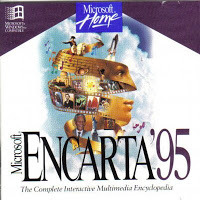 I first heard Soundgarden on Encarta 95. The CD-ROM encyclopedia came with my family’s first PC and it would be another couple of years before we had the internet, so Encarta was basically itin the way of authoritative knowledge in my house besides maybe my parents (iffy propositions) and the newspaper.
I first heard Soundgarden on Encarta 95. The CD-ROM encyclopedia came with my family’s first PC and it would be another couple of years before we had the internet, so Encarta was basically itin the way of authoritative knowledge in my house besides maybe my parents (iffy propositions) and the newspaper. Where Encarta beat my folks, the newspaper and even the leatherbound volumes of Encyclopedia Britannica at my Nanas, was that it had audio and video clips.
For some reason, Encarta had a clip of ‘Nothing to Say’, in which Chris Cornell screamed tunefully (or sung screamfully) about his own in articulateness. I was twelve and shy and catching up on grunge just as its first, heady phase was ending. But Encarta didn’t have a clip from Nirvana or Pearl Jam or Alice in Chains (or Zeppelin or Sabbath or The Beatles). I think it may have had Elvis Costello’s ‘Pump it up’ (anyone?), but the only one I can remember vividly —because I returned to it whenever I was done “researching” whatever had prompted me to slide that CD into the tray — was ‘Nothing to Say’.
Soon enough I’d be sucked into Superunknown (I couldn’t decide if my favourite song was ‘The Day I Tried to Live’ or ‘Fell on Black Days’ – the answer depended on how depressed I was / how much I privileged Ben Sheppard’s bass over other elements of the band), then back though Badmotorfinger and forward through Down on the Upside.
For a long time I thought Soundgarden had two singers, one who sung and another who screamed. Later I learnt that Cornell had thought the same thing about Led Zeppelin. So there’s something to be said for growing up without the internet.
Euphoria Mourning
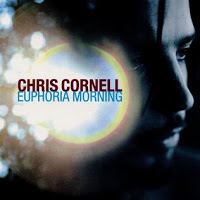 When my father died in 1999, I was given two jobs. Choose the music and write the eulogy. (Also: eat something!)
When my father died in 1999, I was given two jobs. Choose the music and write the eulogy. (Also: eat something!) My father had been suffering from depression. He’d only just been diagnosed, though the doctor said he would have been suffering from it for many years. That the crisis of the past few weeks were part of something much bigger. A calmer, better-fitting black dog, but one more difficult to dislodge. He was prescribed drugs, or drugs were the next step, but then he died without ever popping a single Prozac.
In my eulogy six days later I quoted from ‘Seasons’, a solo effort from Cornell that appeared on the Singles soundtrack:
I wanna fly above the stormBut you can’t grow feathers in the rain
What I wanted to be saying, what I thought I was saying, was that I understood. That I forgave my father.
(Forgiveness — proper, complete forgiveness — it turns out, took longer to manufacture, but now I look back at those words, and the sentiment with which I’d used them, and say, ‘Yeah, totally.’)
I included two other Cornell songs on the cassette I gave the sound guy at the church: ‘Say Hello 2 Heaven’ from Temple of the Dog (the funeral coincided with the week I believed in heaven) and ‘Sunshower’, a more recent solo Cornell offering which, I think, played after Joe Cocker’s ‘With A Little Help from My Friends’, my dad’s favourite song and the one to which we carried him out to the hearse.
Cornell’s music wasn’t my father’s (he liked Soundgarden well enough, though seemed more interested in Radiohead), but he was dead and I figured people would cut me some slack if I inserted a bit of myself into proceedings.
Later that year, Cornell released his first solo album, Euphoria Morning. I remembering listening to it in the car a lot as we drove around the country, my mum, my brother and I, staying with relatives who offered escape and distraction (for me and my brother) and a willing ear (for my mother).
Originally, Cornell was going to call the album Euphoria Mourning, but the ‘u’ was omitted in a typo at some point in production and the new title stuck. The sense of loss, though, was apparent to me. ‘Wave Goodbye’, in which Cornell does his best Jeff Buckley to farewell, uh, Jeff Buckley. ‘Preaching the End of the World’. ‘When I’m Down’. ‘Disappearing One’. Cornell had made an almost tender album for me to wallow in my grief (and the general teenage downer that I’d been on before my dad’s death), and it was wonderful.
Save yourself
In 2002 I was at university, living in a different town, living a different life. I was less imprisoned by my shyness, less hobbled by grief and my arrogance, which had bordered on misanthropy, had been chiseled away in the process of living this life.
Then I got really sick. I was coming back from University Games in Hamilton, in a van full of other students, and had to throw up in Taihape. By the time we made it back to Wellington I was a shivering wreck. My girlfriend took me to A&E and they thought it might have been meningitis. I got a spinal tap. I remember the pain. Trying not to vomit while they drained my spinal fluid. The fear.
After a shitty night in hospital they told me it wasn’t meningitis. A severe viral infection was as far as the diagnosis went before I was dismissed and left to lie in my bed for a week wracked by headaches, vomiting and diarrhea.
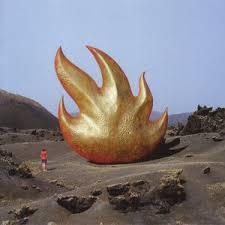 At some point in this hellish week I heard ‘Cochise’, the first single from Cornell’s collaboration with members of Rage Against the Machine. This was still before the internet was ubiquitous. My flatmate had it on the PC in his room, but I didn’t have my own device (I wrote all my essays in computer labs!). So when ‘Cochise’ came on the radio, it was the first I’d heard of Audioslave. And it blew me away, in spite of my physical weakness and torpor. I listened to the same station for hours until they played the song again so that I could record it onto a cassette, something I hadn’t done since leaving home.
At some point in this hellish week I heard ‘Cochise’, the first single from Cornell’s collaboration with members of Rage Against the Machine. This was still before the internet was ubiquitous. My flatmate had it on the PC in his room, but I didn’t have my own device (I wrote all my essays in computer labs!). So when ‘Cochise’ came on the radio, it was the first I’d heard of Audioslave. And it blew me away, in spite of my physical weakness and torpor. I listened to the same station for hours until they played the song again so that I could record it onto a cassette, something I hadn’t done since leaving home.After a skittery intro that called to mind rotor blades and scorched earth, Cornell comes in at full volume (I love the conversational ‘Well’, but the way):
Well, I've been watching
While you've been coughing
I've been drinking life
While you've been nauseous
And so I drink to health
While you kill yourself
And I've got just one thing
That I can offer
Go on and save yourself
And take it out on me
Two minutes before, three years had felt like a lifetime of distance between me and the kid I thought I’d left in Palmerston North. But here was Chris Cornell talking to me once more, thrillingly locked in his screaming register (save for a bridge that ends in the screamiest of screams), backed by a heavier, funkier band.
Had I heard about the collaboration with Morello, Commerford and Wilk before I heard the song, I’d have shaken my head and said, ‘Trainwreck’. But it felt as if Cornell had managed to bend Rage to achieve his own means. Which is pretty much what Cornell did for three records with Audioslave.
What would Zack de la Rocha do with a song like ‘Like a Stone’?
I was lost in the pages
Of a book full of death
Reading how we'll die alone
And if we're good, we'll lay to rest
Anywhere we want to go
Even the titles ring out with Cornell’s fixations: ‘Last remaining light’, ‘Drown me slowly’, ‘Heaven’s Dead’, ‘The Curse’, ‘Until we fall’, ‘Broken City’, ‘Nothing Left to Say But Goodbye’…
Far away from here
When Cornell was young, his depression had such a grip upon him that he could not leave the house.
But then he did.
And he kept leaving the house, kept producing music about depression and crucifixion, kept penning goodbyes that weren’t quite final until now.
Chris Cornell had plenty to say and he said it. I’m sad that he’s not with us anymore, that maybe he felt like no one was listening, that he couldn’t grow feathers amid this last storm. I mean, fuck.
Seriously, fuck.
But then I listen to a song like ‘Boot Camp’, which is off Soundgarden’s last record before breaking up in 1997. It’s less than three minutes long, without sharing any traits you might associate with a sub-three-minute pop song. It starts with a two-phase, 1:14 long, intro, followed by a long, meandering verse and a soaring refrain (‘Far away, I’m far away from here’), and it suddenly wraps up.
It’s a track that could have resolved itself in seven minutes, become more of a song, but also, I suspect, harder to love.
Coda
Chris Cornell means more to me than a tiny tingle of cusper nostalgia. He’s more than the soundtrack of a morose thirteen-year-old or a grieving-sixteen-year old or an incapacitated nineteen-year-old. Because he’s all of these things. And none of them. However much I might think that I could conjure him up with my words, that there’s something redemptive in them, I can’t / there isn’t.
All that’s left is the familiar routine of grief-binging on an artist’s back catalogue and dipping in and out of the reports that will emerge over the coming days (the latest means I’m not sure I can listen to ‘Pretty Noose’ any time soon).
And this, of course, this bit, where I dutifully provide all the links to places you can get help, and then I personalise it in the hope that I can extend a life and expand, by whatever margin, the joy and music and sorrow and beauty in the world.
But seriously. Find that one person you can talk to. Don’t be afraid to ask. And don’t be afraid to be sad, to listen to sad songs or sing them to the bath as it fills.
If you’re in New Zealand, here are three places to start:
www.depression.org.nz, phone 0800 111 757Lifeline, phone 0800 543 354Mental Health Foundation
But don’t forget the music…
Published on May 18, 2017 19:33
May 13, 2017
Burst around truth: an excursion in recurrent neural network poetry
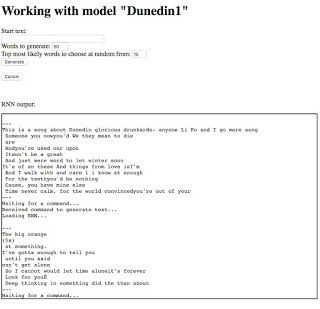 The web interface for my (I mean Lech's) poetry machine
The web interface for my (I mean Lech's) poetry machineThis post is scheduled to go live during the Dunedin Writer’s Festival event on Found Poetry. The event’s description reads:
Like hunter-gatherers armed with pens, paper and acute observation skills, six Dunedin writers have composed poetry collected from the fabric of the city. Come along and fill up on a diet of found poetry foraged for you by some of our finest.
False starts
I’ve been living in Dunedin just shy of four months, which is an awkward length of time. It’s too long to be able to feel like a tourist and blithely, touristically, make poetry without feeling every misstep. But it's too short to know exactly what I want to say, even if I’m to say it with other people’s words.
Point and case, my first misstep when I knew I had to find some poetry. The idea came to me when I first visited Forsyth Barr Stadium (for the Warriors v Bulldogs, alas, rather than a Highlanders game – spot the out of towner!). I looked at the names of the stands. There was the Speights Stand (of course), the Mitre 10 Mega Stand (fitting as the huge orange shed is visible from pretty much every lookout), the Otago Daily Times stand, which is only there when it’s needed (eg for All Blacks games, super rugby finals, not NRL games), which seemed to say something about traditional media and local media. Very quickly I thought of a range of other temporary, interstitial stands that could be inserted in the seating plan of Dunedin’s stadium to give a more meaningful map of what it means to live in Dunedin in 2017. Emersons needed a stand beside Speights, for starters. And what were the local businesses displaced by, or put out of business by, Mitre10 Mega?
But the more I looked at my seating plan, the more I realised, I didn’t know enough.
That, and making a seating plan poetic seemed to pull the thing in less meaningful, but funnier directions (The Lemonade Stand stand, The Stand By Your Man stand).
Verdict: abandon!
Moving on
My next and more enduring project was inspired by the screens in Toitu (Otago Settlers Museum) that played Dunedin Sound music videos. I sat there for ages, suddenly recognising streets and beaches of temporary hometown.
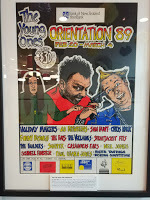 The music was something I could identify with, even before I’d moved down here. In my first week as the Burns Fellow I sat in Poppa’s Pizza and stared in awe at the orientation posters from the late eighties and early nineties: The Chills, Straitjacket Fits, The Bats, The 3Ds... It was one of those I just wasn't meant for these times times.
The music was something I could identify with, even before I’d moved down here. In my first week as the Burns Fellow I sat in Poppa’s Pizza and stared in awe at the orientation posters from the late eighties and early nineties: The Chills, Straitjacket Fits, The Bats, The 3Ds... It was one of those I just wasn't meant for these times times.Back in 2008, while questing for a million words, I generated a lot of poetry with the help of Google Translate. I'd take song lyrics from bands like The Tragically Hip, Procul Harum and Monster Magnet, translate into (for example) Russian, then Indonesian, then Chinese (Simplified), then English, then Italian, then Latin, then English, then Welsh, then Hindi, then English. Each time the text slipped back into English, it’d scavenge any interesting collision of words and keep going until I’d built up a stockpile of phrases to then construct something new.
If you’re interested, here are some examples of finished poems that are available online:
Himalyan White (started life as ‘Nights in White Satin’ and ‘Whiter Shade of Pale’)Glen Coe (started life as ‘Whipping Post’ by The Allman Brothers Band)In Time (started life as ‘Limo Wreck’ by Soundgarden)(I played around with other things too. A series of warped Shakespearean soliloquies. Translating poems from languages I didn’t know without any help — analog or digital (‘The Bumblebee’ came from my ignorant ‘translation’ from the Turkish of Mustafa Ziyalan’s poem ‘Ad Bulamadiğim’).
This is all to say I have an interest in alternative means of text generation, the place of the writer in the process, and the relationship between song lyrics as text and poetry — so it was not a very big leap to make to decide to take lyrics from Dunedin Sound bands and generate something new from this corpus.
The final piece of the puzzle is my interest in Recurrent Neural Networks (RNN). I guess I have a soft spot for AI that can’t quite pass the Turing Test. I can listen to ChatBots talking to each other for hours. And when I read a list of recipe titles generated by an RNN that had been trained on cookbooks, I seriously lost my shit.

Match-making
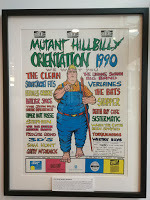 So, I wanted to learn more about RNNs, and after a bit of reading up I knew I couldn’t do it alone. One of the great things about being part of a university, however temporary, is the possibility of collaboration just seems that much more achievable. I reached out to Anthony Robins in the University of Otago’s Computer Science Faculty, because his name appeared most often with respect to neural networks. We met up for coffee and he seemed excited by my project but was in the throes of editing a book and didn’t have time to help. He sent an email to five of his colleagues and after a few nibbles I met up for another coffee with Lech Szymanski.
So, I wanted to learn more about RNNs, and after a bit of reading up I knew I couldn’t do it alone. One of the great things about being part of a university, however temporary, is the possibility of collaboration just seems that much more achievable. I reached out to Anthony Robins in the University of Otago’s Computer Science Faculty, because his name appeared most often with respect to neural networks. We met up for coffee and he seemed excited by my project but was in the throes of editing a book and didn’t have time to help. He sent an email to five of his colleagues and after a few nibbles I met up for another coffee with Lech Szymanski. Lech had developed a basic RNN for teaching purposes last year, fed it Pride and Prejudice and it was able to spit out Austeny prose with the right prompts. Lech offered to set up a web interface on one of the university’s servers so I could access this RNN, upload my own corpus, select how to train it (more on this in a second), then play around with the outputs.
And in a matter of days I had the keys (read: password) to this amazing text generator. In terms of what can be achieved in language generation, it’s still highly basic. But it has proved an amazing sandpit in which to cut my teeth (and to generate some poetry for tonight’s event!).
Method statement
Step 1: Collect the text (corpus) you’re going to feed into the RNN.
For me this involved about 10 hours of scouring the internet for all available song lyrics by Dunedin Sound bands up to about 1995. This was quite hit or miss. I got quite a lot of Chills, Bats, Verlaines, Clean and Straightjacket Fits. Others (eg The Gordons, Look Blue Go Purple) were much harder to come by, a reflection of the fact these lyrics sites are heavily weighted towards contemporary puff and hosted overseas. All up, I got about 300 songs (45,000 words). I’d hoped to have about double that, and maybe someone will read this and help me out. But I didn’t have time to transcribe lyrics from some of the great bands that were unfairly under-represented in my corpus, and thems the breaks.
A note about the size: the RNN basically learns to speak English from the text you upload and train it on. If a word isn’t in the corpus, it won’t know it. If a word is only in there once, the model will only know one what that word can occur. There’s an element of randomisation in word selection, but to get unique but genuine sounding outputs requires a huge and varied corpus and a really well calibrated model. It’s fair to say my first attempts were going to be sitting at the more cursory end of the spectrum.
Step 2: Upload the .txt file containing these lyrics to the RNN.
Step 3: Specify the training parameters for the new model:
Number of epochs – how many times the network goes over the entire training data during its training. The more epochs, the better at speaking this particular brand of English it’s going to be.Number of hidden neurons – the size of the network. More neurons, more capacity to store patterns, but the longer it’ll take to train.Predict from a sequence of X words – the network takes a fixed number of words in order to predict the next one.For my first model, I went with the default (500 epochs, 128 hidden neurons, sequence of 5 words)
Step 4: Start training
And…
Waiting for a command...Received command to train...Error! Couldn't find dunedin...Waiting for a command...Received command to train...Error! Couldn't find dunedin...Waiting for a command...Received command to train...Error! Couldn't find dunedin...
Okay, so there were a few hiccups to start with (no spaces in .txt filenames, please).
When we got it going, the first model took around 12 hours to train, which meant I had a new toy to play with when I got into the office the next morning.
Generating text
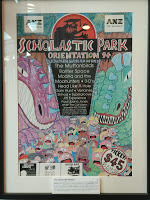 Once you’ve trained your model, you need to give it some starting text that it will then follow on from, the number of word to generate, and the number of top most likely words to choose at random from.
Once you’ve trained your model, you need to give it some starting text that it will then follow on from, the number of word to generate, and the number of top most likely words to choose at random from.Version 1
This first model, with 500 epochs of training and a fairly grunty 128 neurons, was so well schooled in the 300-ish song lyrics, that if you set the number of top most likely words to choose from at random around 5 or lower, it would very quickly start spitting out verbatim Verlaines lyrics or just saying soft bomb soft bomb soft bomb (Thanks, The Clean!) until it had dutifully fulfilled the order of words it needed to generate.
By turning up the randomness, it got a bit more interesting.
Very early on it became clear this exercise, while it might not produce the greatest poetry, it’s a really good way for humans (or me, at least) to synthesise a decent amount of text and look for patterns.
Because I was hoping to create a ‘found’ poem or two that reflected back on Dunedin, I was on the lookout for items of local colour in the generated text. But unlike the music videos, and that guitar jangle, there wasn’t a lot of quintessential Dunedin nounage in the corpus. ‘Dunedin’ never once came up. No suburbs (I don’t think). No ‘rugby’ or ‘Speights’ or ‘Mitre 10’. Which is telling, perhaps, in that this was counter-culture, even for Dunedin. The music videos on George St or St Clair beach weren’t so much parochial proclamations as the result of fiscal imperatives.
As I continued to tinker, I found the most glee in using Dunedin-themed seed words (eg ‘Welcome to Dunedin’, ‘Take Your Place In the World’), as a kind of antagonistic gesture to drawn these fiercely geo-generic lyrics into the service of overt local commentary.
But first I needed to tinker with the model.
Version 2
I got the RNN to retrain on the same corpus but only for 200 epochs, using 32 neurons and 5 word predictive sequence. The hope was that this would provide a model that would be prone to more random combinations of words, without producing entire gibberish.
And it did seem to work better, for my purposes at least.
In amongst the noise…
There's wonder whetherÊ, sweet(Where bark enoughBut(Why?,It’s hipper on once awake
…there were moments of almost poetry:
I'm burst around truth Tremble cos it's time for love We want a pain that grows But blind away our worries Nah surprise, mindless idiot
Poetry? Or a direct address to the mindless idiot fiddling with the knobs?
To generate proto-poems, I’d feed the model the same phrase three or four times, tell it to generate 40 or 50 words at different degrees of randomness, and tape them together as verses.
I’d then cut and paste the verbatim output and do a light edit, getting rid of the nonsense characters, adding spaces to awkwardly conjoined words, and fixing tenses.
Then I’d cut and paste that text and do a heavier edit, removing errant words or moving them within a line, changing pronouns to maintain the unity of the verse.
If it was going really well, I might do an even heavier edit, which would leave just the cream of the model’s poetic output.
Anyone who spends any time tinkering with methods of text generation for creative means is basically willing themselves into a state of extreme credulity. You have to take what you’re given and assign it meaning when the machine had no such intention. For me, there were two impulses, at times complimentary, at times competing. The text from the model was:
The disembodied voice of Dunedin itself; and/orAutobiographical (i.e. the words Craig really wants to say, but didn’t know it until he pushed “Generate”An example of a ‘poem’ using this second model with 3 rounds of editing from me:
Take your place in the world Take your place in the world Ride on the air, on sorrow, through the world and all you’re Keeping back You think I could pass the living touch to you? Done. A plundering drive inside the water Look at this head,it's really my cactus upon me Take your place in the world, cross the blue And accept a lighttomorrow they came from todaytake me up, love that's more than money,just go, baby, without my sense.
Version 3
Ideally, I wouldn’t have to resort to anything but a light edit and let the model talk for itself. The biggest drawback seemed to be the limited corpus. If you could only learn to speak from 300 song lyrics, you’d struggle to be articulate no matter how many different ways you studied them.
But I’d exhausted the online well and wasn’t about to transcribe lyrics for 30 hours just to double the size of my corpus. So, in the spirit of experimentation, I added the Beatles songbook (30,000 words) to my Dunedin Sound lyrics. I chose the Beatles because they were a known quantity, the lyrics were readily available and have relatively little local flavor, and adding some more Lennon and McCartney songwriting DNA into the model could only be a good thing if the aim was to create more recognisable song lyric text.
And it worked pretty much as I’d hoped. There were hardly ever words that were obviously The Beatles' (begone Pam and Maxwell) and the dark and brooding nature of the previous models was still retained.
So I started feeding the model seeds of Dunedin and in return it gave me the raw materials for Dunedin-y poems. I still needed to edit, and the more I edited the better they became as poems (especially ones with the intent of reading aloud) — but of course I’d think that about my own editing.
I don’t want to do much more analysis of the poems, they should speak for themselves, but I will add that, knowing what you now know about their genesis, it opens up a range of reading approachs that wouldn't normally exist, like:
Looking for identifiable words or phrases from Dunedin Sound or (Beatles) songsLooking for ‘the joins’ – where I might have wielded the heaviest hand in the editing for structural reasonsReading my palms – the search for autobiographical elements despite my efforts to create a distance between me and the textDobbing Dunedin in – the search for the truth of Dunedin from the (mangled) mouths of its jean-clad prophetsSo to close, I’ll leave you with two poems (I’m still not sure which I’ll read tonight – I’m the 6th of 7 poets, so I’ll pick which fits best on the fly), both generated using the third model (Dunedin Sound + Beatles lyrics, 300 epochs, 32 neurons, 10 word sequence). The titles are the seed text I used for each generative act.
Dunedin Dunedin,you call you with your old treesthat time cannot bite: Welcome to Think Small. Dunedin the one, it's just, How was I doing? Was I right? You’re inside me and you've got a summer! Rivers will rise,They'll question you: North Dunedin, I spend my life leaving,trapped, refrain.Another Lady hard from any year, any horizon. The artist using her kaleidoscope knows to touch the heads of my bedroom for silence. Yeah, she doesn't. Dunedin, If I can’t get a better wave of submarine aches, Sail and sunset and back Monday, that distant other lover’s boat slips in two: you we I me I can guess what they're about to say,It's: Dunedin with the night darkness,should overtime bring you round all the west commences browneasy-pleaser sling stood stillThere's the little madman’s papers-Yes He put on your love song, Pyromaniac, Take in darkness what we seem,a bad danger. Dunedin with a little hand everybody’s ticked.She was bringing us apart.Dunedin, don't prove ugly!
Welcome to Dunedin Welcome to Dunedin at dark. You don't force dreams. People see only the thread that ever dreamed And, for you, a star. Welcome to Dunedin. Ain't they run out of naked sorrow gloom? Now you'll stuff shaking bright eyes where the wind he reaps soft passes of a blue town, and Baby, you're dead. What? Please. Now gone in confuséd linger. Welcome to Dunedin! [Chorus: dance to question the mind] Welcome to Dunedin, The impairing ocean is now blue. Say you would never never do the lie by land. The message turned the pot satin. A seized day hauled off. We belong that tell the prayer. Welcome to Dunedin,Old hallows joyride and no-one gazing beside me come snow. Trust that I'll get beauty,That any chaos will.
Roll credits
Thanks very much to Lech Syzmanski and Anthony Robins. Thanks also to Clare Mabey & the team at Dunedin Writers Festival for putting me on the Found Poetry session and starting me off on this path. I have a lot of links to other interesting stuff people are doing with neural networks, but I'll save that for another time.
Published on May 13, 2017 01:00
May 10, 2017
Hot under the collar: Fortnight #7 of the Burns
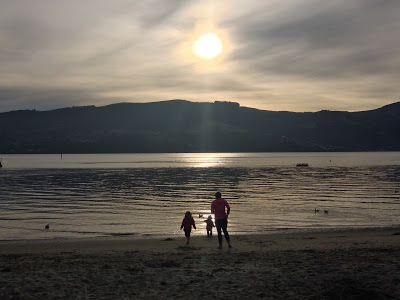 Macandrew BayFortnightly word tally: 8,279
Macandrew BayFortnightly word tally: 8,279(1stweek: 3,018; 2nd week: 5,261)(Novel 4,097; poetry 1,356; blog 2,215; essays 611)
You may be able to guess from the fact it’s Thursday of the week following the end of my seventh fortnight that things are a bit of a jumble at the moment.
Right now, the Dunedin Writer’s Festival is on. I have a session tomorrow about the end of the world and one Saturday about Found Poetry – both topics are just far enough outside my wheelhouse that I’ve needed to put some work in to feel ‘ready’. I’m also trying to get along to as many other sessions as I can.
Then there’s getting ready for Italy. I fly out on the 20th and have had to prepare two presentations that I’ll be delivering to earn my keep, in addition to playing travel agent for myself for the 7 days I have after my conference to location scout for my location scouting novel.
It’s fair to say I feel bad about progress on THE LOCATION SCOUT. Even if I didn’t have the Italian curveball (which I still feel, on balance, is an awesome curveball to have been thrown) I would still be a bit mired right now. I keep coming up with structural innovations that don’t seem to work / aren't necessary / are insane when I attempt to make them in the manuscript. Fool!
But these fallow(ish) patches are all part of it.
There’s a cult in my book (or there will be) that I didn’t know would be there two months ago. I’m probably another two months of writing (and gallivanting) before they appear on the page, but it’s the time I spend now -- reading apparently unrelated Guardian articles or watching Fargo or peeling mandarins and having fragmentary thoughts about the downside of a surfeit of freedom and what charisma is in a post-John Key world -- that will equip me to write this cult to life in July (or whenever – this isn’t one of those contracts with the universe, alright?).
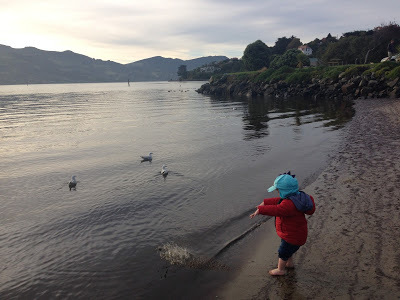 Barefeet in May? My son might be a Southern Man, yet.
Barefeet in May? My son might be a Southern Man, yet.
Published on May 10, 2017 19:21
May 1, 2017
April Consumption Diary
Books
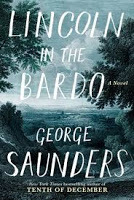
Lincoln in the Bardo by George Saunders (novel, audiobook)
I was really looking forward to this. I even changed which Audible shop my account was under to access it. And I knew that the variety of narrators (both on the page and in the audiobook) would take some getting used to. But as a novel, it never really lifted beyond two linked concepts (Lincoln through the eyes of contemporary accounts; the 'lives' of those in the Bardo). It just felt like a (really) long Saunders short story; the length left this reader unable to escape (or forgive) the work's unevenness.
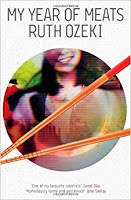 My Year of Meats by Ruth Ozeki (novel, audiobook)
My Year of Meats by Ruth Ozeki (novel, audiobook)
I can't remember why I read this. (Stares into space for five minutes.) Oh yeah, one of the two plot lines followed a gopher/translator/producer of a TV show, and I thought this might be interesting given I'm working on a novel about a director/location scout. But it was so dull. The two parallel plotlines with periodic convergences. The deflating prolepsis. Oh well.
Time Travel: A History by James Gleick (non-fiction, audiobook)
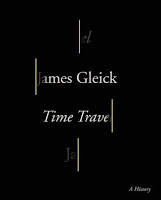 I can remember why I read this: a) I listened to this and Danyl and Pip made it sound good and b) I've been interested in time travel for a long time (I even have a notebook dedicated towards a time-travelly novel on Evernote).
I can remember why I read this: a) I listened to this and Danyl and Pip made it sound good and b) I've been interested in time travel for a long time (I even have a notebook dedicated towards a time-travelly novel on Evernote).
Gleick's book was really good. Like one of those popular histories for people who like to think they're too smart for popular histories. Most of the recent time travel books/films I thought about during the earlier sections were mentioned later on in the book - but by then Gleick has abandoned literary criticism for theoretical physics and philosophy. Which is fine. This is the guy who wrote a book about chaos theory. But I think there's another book (or at least a few decent chapters) on what people are doing with time travel after a century of the genre, and dismantling this from a predominantly literary perspective.
Picture This by Joseph Heller
I was writing a scene where people clambers to see a friar levitate in the year 1653, and wanted to show that this wasn't so long ago by mentioning things going on elsewhere in Europe. One of these was Rembrandt painting Aristotle contemplating a bust of Homer. Which led me to read Heller's novel all about this painting.
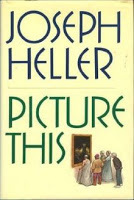 After the first three chapters, I was like: fuck this is good. God, Heller's a genius. But after another I was like: Hmm. Didn't I think the same about Closing Time and Something Happened but can't really remember what happened in either (and did I even finish Something?)?
After the first three chapters, I was like: fuck this is good. God, Heller's a genius. But after another I was like: Hmm. Didn't I think the same about Closing Time and Something Happened but can't really remember what happened in either (and did I even finish Something?)?
And eventually I started skim reading.
I think the technique - factual retelling of history (focusing on the quirks/convergences) powered by a strong narrator - could work over a longer narrative, with a few tweaks (or with some narrative breadcrumbs followed in a more traditional fashion). I thinking of Vonnegut's Galapagos, which is by no means perfect, but (perhaps because it has to get fictional very quickly as it relies on flashing 1000s of years into the future) does enough of the story-telling basics to pull a reader through to the final page.
Others: poetry (especially when looking for things to read at the Town Belt Traverse), academic articles about Damanhur, Nomadelfia, magnetic levitation... but the big 'other' was podcasts, which probably deserves it's own category (I haven't recorded these in my previous two consumption diaries). So...
Podcasts S-Town
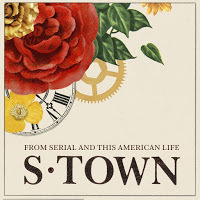 I devoured this over about 48 hours. I don't think it was morally indefensible. (Someone in my Facebook timeline posted this righteously - and no, they hadn't listened). I thought it worked we as a non-fiction audio-novel. I liked the way it shifted gears at the end of the third episode. Yes, it was a bit uneven. Yes, the last two episodes were a bit circular and drawn out. But it was a good story, well told in a (relatively) fresh way: the best book I read this month (if it had been a book).
I devoured this over about 48 hours. I don't think it was morally indefensible. (Someone in my Facebook timeline posted this righteously - and no, they hadn't listened). I thought it worked we as a non-fiction audio-novel. I liked the way it shifted gears at the end of the third episode. Yes, it was a bit uneven. Yes, the last two episodes were a bit circular and drawn out. But it was a good story, well told in a (relatively) fresh way: the best book I read this month (if it had been a book).
Missing Richard Simmons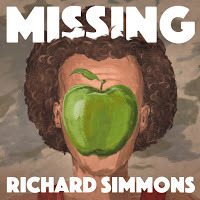 I listened to this late March/early April. Not quite as absorbing as S-Town while ploughing a similar field. The fact Simmons is still alive, still hiding, meant the ending was always going to be a bit of a fizzer. But the way the penultimate episode promised a bunch of things that then weren't covered in the finale was shoddy and disappointing.
I listened to this late March/early April. Not quite as absorbing as S-Town while ploughing a similar field. The fact Simmons is still alive, still hiding, meant the ending was always going to be a bit of a fizzer. But the way the penultimate episode promised a bunch of things that then weren't covered in the finale was shoddy and disappointing.
The Director’s Cut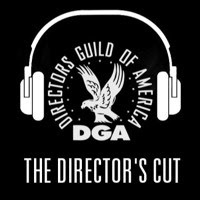 Unlike the first two podcasts, this isn't sequential story-telling in podcast form. It's standalone talks (generally 30-50 mins) where one director interviews another director about the film they've just finished and (in most cases) the audience has just seen. And because this is the Directors Guild of America's podcast, you get some heavy hitters (Scorsese interviewing Spielberg, the director of Rogue One interviewed by the director of the young Han Solo Star Wars flick, etc).
Unlike the first two podcasts, this isn't sequential story-telling in podcast form. It's standalone talks (generally 30-50 mins) where one director interviews another director about the film they've just finished and (in most cases) the audience has just seen. And because this is the Directors Guild of America's podcast, you get some heavy hitters (Scorsese interviewing Spielberg, the director of Rogue One interviewed by the director of the young Han Solo Star Wars flick, etc).
Even the lesser names/films are interesting (especially in my quest to write a novel about a couple of filmmakers). The most recent episode featured the director of straight-to-Netflix-movie The Discovery, which I just watched on Netflix and thought - this was like The OA without the time afforded by a TV series. And who was he interviewed by but the director of The OA (and the two of them went to film school together!!). OthersI also listen to every episide of 3 New Yorker podcasts: New Yorker Fiction Podcast (a writer picks a short story from the New Yorkers archive to read and discuss... I did a list of my top episodes of this podcast to date in 2011); New Yorker Poetry Podcast (poet chooses a poem from the archive to read and discuss and also one of their own); The Author’s Voice (short stories from the most recent edition of the magazine read by the author).
Music
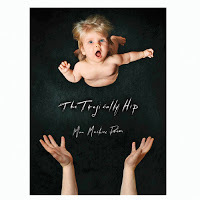 This was the month where I found out how remiss of a Tragically Hip/Gord Downie fan I’ve been the last few years. When I first heard about Downie’s terminal diagnosis last year (a couple months late on that, too), I was numb. Downie’s music meant more to me that Bowie and Prince. I’d exchanged emails with him (basically: Him: thanks for the book, I haven’t read it yet, but found it again when we were moving house; Me: hurrmurrhurgunugh!). I don’t know if he ever got around to reading A Man Melting.
This was the month where I found out how remiss of a Tragically Hip/Gord Downie fan I’ve been the last few years. When I first heard about Downie’s terminal diagnosis last year (a couple months late on that, too), I was numb. Downie’s music meant more to me that Bowie and Prince. I’d exchanged emails with him (basically: Him: thanks for the book, I haven’t read it yet, but found it again when we were moving house; Me: hurrmurrhurgunugh!). I don’t know if he ever got around to reading A Man Melting.
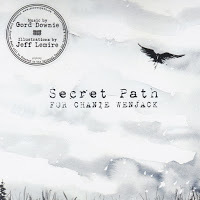 I listened to The Hip’s most recent album, Man Machine Poem (2016), a few more times after learning The Hip’s days were numbered, but didn’t take to it. There seemed too much overlap with Now for Plan A (2012), another album that never really stuck with me. I could have gone back and listened to Phantom Planet and Day for Night and Trouble at the Hen House and Music @ Work and Battle of the Nudes but that kind of maudlin impulse didn’t fit with how I felt about those albums.
I listened to The Hip’s most recent album, Man Machine Poem (2016), a few more times after learning The Hip’s days were numbered, but didn’t take to it. There seemed too much overlap with Now for Plan A (2012), another album that never really stuck with me. I could have gone back and listened to Phantom Planet and Day for Night and Trouble at the Hen House and Music @ Work and Battle of the Nudes but that kind of maudlin impulse didn’t fit with how I felt about those albums.
I thought about writing another email to Gord, but that would really be for my benefit, wouldn't it? His time was more precious than mine, so I saved him the hassle of reading and deciding whether to reply (eight months on, I’m not sure this was the right decision, but).
So I put Gord outta my mind.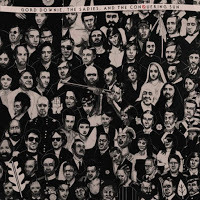
For whatever reason, in April all of this came back to me. I found out Gord had already released his solo album, Secret Path, which is really good. Maybe not as great as Nudes, but at least as good as The Grand Bounce.
Then I found Downie had made an album with The Sadies, And the conquering sun, in 2014. (It isn’t available on Spotify, hence the absence of any tracks from this album in my April playlist).
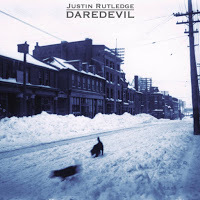 THEN I found Justin Rutledge’s Daredevil, also from 2014, which is an album entirely of Hip covers (cherry-picked from their heroic peak). Rutledge strips back these songs in a way that’s reminiscent at times of Gary Jules’ cover of Tears for Fears’ ‘Mad World’. The ‘Jules Approach’ has been employed often since, but Rutledge isn’t mellow for the sake of mellowness. He’s trying to give Downie’s words fresh air, and succeeds.
THEN I found Justin Rutledge’s Daredevil, also from 2014, which is an album entirely of Hip covers (cherry-picked from their heroic peak). Rutledge strips back these songs in a way that’s reminiscent at times of Gary Jules’ cover of Tears for Fears’ ‘Mad World’. The ‘Jules Approach’ has been employed often since, but Rutledge isn’t mellow for the sake of mellowness. He’s trying to give Downie’s words fresh air, and succeeds.
From the songs Rutledge selected (eg ‘Grace, too’, ‘Thugs’, ‘Springtime in Vienna’), I reckon we have similar tastes. Though I could easily propose another ten songs for a covers album that’d be just as awesome and complete.
I've also been working on a project about the Dunedin Sound, hence all those bands on my playlist this month. And I discovered Arboretum and am really into them at the moment. They remind me of Rook-era Shearwater (y'know, before they went all disco).
Films & TV
Better Call Saul (Season 3 thus far) - I agree with Jose Barbosa's claim that BCS is better than Breaking Bad (at least more consistently good-to-great) though my reasons might be different.
Fargo (Season 2)
The Discovery
I'm Still Here
Heavy Metal
Gangs of New York
Louis CK 2017
Segnati da Dio

Lincoln in the Bardo by George Saunders (novel, audiobook)
I was really looking forward to this. I even changed which Audible shop my account was under to access it. And I knew that the variety of narrators (both on the page and in the audiobook) would take some getting used to. But as a novel, it never really lifted beyond two linked concepts (Lincoln through the eyes of contemporary accounts; the 'lives' of those in the Bardo). It just felt like a (really) long Saunders short story; the length left this reader unable to escape (or forgive) the work's unevenness.
 My Year of Meats by Ruth Ozeki (novel, audiobook)
My Year of Meats by Ruth Ozeki (novel, audiobook)
I can't remember why I read this. (Stares into space for five minutes.) Oh yeah, one of the two plot lines followed a gopher/translator/producer of a TV show, and I thought this might be interesting given I'm working on a novel about a director/location scout. But it was so dull. The two parallel plotlines with periodic convergences. The deflating prolepsis. Oh well.
Time Travel: A History by James Gleick (non-fiction, audiobook)
 I can remember why I read this: a) I listened to this and Danyl and Pip made it sound good and b) I've been interested in time travel for a long time (I even have a notebook dedicated towards a time-travelly novel on Evernote).
I can remember why I read this: a) I listened to this and Danyl and Pip made it sound good and b) I've been interested in time travel for a long time (I even have a notebook dedicated towards a time-travelly novel on Evernote).Gleick's book was really good. Like one of those popular histories for people who like to think they're too smart for popular histories. Most of the recent time travel books/films I thought about during the earlier sections were mentioned later on in the book - but by then Gleick has abandoned literary criticism for theoretical physics and philosophy. Which is fine. This is the guy who wrote a book about chaos theory. But I think there's another book (or at least a few decent chapters) on what people are doing with time travel after a century of the genre, and dismantling this from a predominantly literary perspective.
Picture This by Joseph Heller
I was writing a scene where people clambers to see a friar levitate in the year 1653, and wanted to show that this wasn't so long ago by mentioning things going on elsewhere in Europe. One of these was Rembrandt painting Aristotle contemplating a bust of Homer. Which led me to read Heller's novel all about this painting.
 After the first three chapters, I was like: fuck this is good. God, Heller's a genius. But after another I was like: Hmm. Didn't I think the same about Closing Time and Something Happened but can't really remember what happened in either (and did I even finish Something?)?
After the first three chapters, I was like: fuck this is good. God, Heller's a genius. But after another I was like: Hmm. Didn't I think the same about Closing Time and Something Happened but can't really remember what happened in either (and did I even finish Something?)?And eventually I started skim reading.
I think the technique - factual retelling of history (focusing on the quirks/convergences) powered by a strong narrator - could work over a longer narrative, with a few tweaks (or with some narrative breadcrumbs followed in a more traditional fashion). I thinking of Vonnegut's Galapagos, which is by no means perfect, but (perhaps because it has to get fictional very quickly as it relies on flashing 1000s of years into the future) does enough of the story-telling basics to pull a reader through to the final page.
Others: poetry (especially when looking for things to read at the Town Belt Traverse), academic articles about Damanhur, Nomadelfia, magnetic levitation... but the big 'other' was podcasts, which probably deserves it's own category (I haven't recorded these in my previous two consumption diaries). So...
Podcasts S-Town
 I devoured this over about 48 hours. I don't think it was morally indefensible. (Someone in my Facebook timeline posted this righteously - and no, they hadn't listened). I thought it worked we as a non-fiction audio-novel. I liked the way it shifted gears at the end of the third episode. Yes, it was a bit uneven. Yes, the last two episodes were a bit circular and drawn out. But it was a good story, well told in a (relatively) fresh way: the best book I read this month (if it had been a book).
I devoured this over about 48 hours. I don't think it was morally indefensible. (Someone in my Facebook timeline posted this righteously - and no, they hadn't listened). I thought it worked we as a non-fiction audio-novel. I liked the way it shifted gears at the end of the third episode. Yes, it was a bit uneven. Yes, the last two episodes were a bit circular and drawn out. But it was a good story, well told in a (relatively) fresh way: the best book I read this month (if it had been a book).Missing Richard Simmons
 I listened to this late March/early April. Not quite as absorbing as S-Town while ploughing a similar field. The fact Simmons is still alive, still hiding, meant the ending was always going to be a bit of a fizzer. But the way the penultimate episode promised a bunch of things that then weren't covered in the finale was shoddy and disappointing.
I listened to this late March/early April. Not quite as absorbing as S-Town while ploughing a similar field. The fact Simmons is still alive, still hiding, meant the ending was always going to be a bit of a fizzer. But the way the penultimate episode promised a bunch of things that then weren't covered in the finale was shoddy and disappointing.The Director’s Cut
 Unlike the first two podcasts, this isn't sequential story-telling in podcast form. It's standalone talks (generally 30-50 mins) where one director interviews another director about the film they've just finished and (in most cases) the audience has just seen. And because this is the Directors Guild of America's podcast, you get some heavy hitters (Scorsese interviewing Spielberg, the director of Rogue One interviewed by the director of the young Han Solo Star Wars flick, etc).
Unlike the first two podcasts, this isn't sequential story-telling in podcast form. It's standalone talks (generally 30-50 mins) where one director interviews another director about the film they've just finished and (in most cases) the audience has just seen. And because this is the Directors Guild of America's podcast, you get some heavy hitters (Scorsese interviewing Spielberg, the director of Rogue One interviewed by the director of the young Han Solo Star Wars flick, etc). Even the lesser names/films are interesting (especially in my quest to write a novel about a couple of filmmakers). The most recent episode featured the director of straight-to-Netflix-movie The Discovery, which I just watched on Netflix and thought - this was like The OA without the time afforded by a TV series. And who was he interviewed by but the director of The OA (and the two of them went to film school together!!). OthersI also listen to every episide of 3 New Yorker podcasts: New Yorker Fiction Podcast (a writer picks a short story from the New Yorkers archive to read and discuss... I did a list of my top episodes of this podcast to date in 2011); New Yorker Poetry Podcast (poet chooses a poem from the archive to read and discuss and also one of their own); The Author’s Voice (short stories from the most recent edition of the magazine read by the author).
Music
 This was the month where I found out how remiss of a Tragically Hip/Gord Downie fan I’ve been the last few years. When I first heard about Downie’s terminal diagnosis last year (a couple months late on that, too), I was numb. Downie’s music meant more to me that Bowie and Prince. I’d exchanged emails with him (basically: Him: thanks for the book, I haven’t read it yet, but found it again when we were moving house; Me: hurrmurrhurgunugh!). I don’t know if he ever got around to reading A Man Melting.
This was the month where I found out how remiss of a Tragically Hip/Gord Downie fan I’ve been the last few years. When I first heard about Downie’s terminal diagnosis last year (a couple months late on that, too), I was numb. Downie’s music meant more to me that Bowie and Prince. I’d exchanged emails with him (basically: Him: thanks for the book, I haven’t read it yet, but found it again when we were moving house; Me: hurrmurrhurgunugh!). I don’t know if he ever got around to reading A Man Melting.
 I listened to The Hip’s most recent album, Man Machine Poem (2016), a few more times after learning The Hip’s days were numbered, but didn’t take to it. There seemed too much overlap with Now for Plan A (2012), another album that never really stuck with me. I could have gone back and listened to Phantom Planet and Day for Night and Trouble at the Hen House and Music @ Work and Battle of the Nudes but that kind of maudlin impulse didn’t fit with how I felt about those albums.
I listened to The Hip’s most recent album, Man Machine Poem (2016), a few more times after learning The Hip’s days were numbered, but didn’t take to it. There seemed too much overlap with Now for Plan A (2012), another album that never really stuck with me. I could have gone back and listened to Phantom Planet and Day for Night and Trouble at the Hen House and Music @ Work and Battle of the Nudes but that kind of maudlin impulse didn’t fit with how I felt about those albums.
I thought about writing another email to Gord, but that would really be for my benefit, wouldn't it? His time was more precious than mine, so I saved him the hassle of reading and deciding whether to reply (eight months on, I’m not sure this was the right decision, but).
So I put Gord outta my mind.

For whatever reason, in April all of this came back to me. I found out Gord had already released his solo album, Secret Path, which is really good. Maybe not as great as Nudes, but at least as good as The Grand Bounce.
Then I found Downie had made an album with The Sadies, And the conquering sun, in 2014. (It isn’t available on Spotify, hence the absence of any tracks from this album in my April playlist).
 THEN I found Justin Rutledge’s Daredevil, also from 2014, which is an album entirely of Hip covers (cherry-picked from their heroic peak). Rutledge strips back these songs in a way that’s reminiscent at times of Gary Jules’ cover of Tears for Fears’ ‘Mad World’. The ‘Jules Approach’ has been employed often since, but Rutledge isn’t mellow for the sake of mellowness. He’s trying to give Downie’s words fresh air, and succeeds.
THEN I found Justin Rutledge’s Daredevil, also from 2014, which is an album entirely of Hip covers (cherry-picked from their heroic peak). Rutledge strips back these songs in a way that’s reminiscent at times of Gary Jules’ cover of Tears for Fears’ ‘Mad World’. The ‘Jules Approach’ has been employed often since, but Rutledge isn’t mellow for the sake of mellowness. He’s trying to give Downie’s words fresh air, and succeeds. From the songs Rutledge selected (eg ‘Grace, too’, ‘Thugs’, ‘Springtime in Vienna’), I reckon we have similar tastes. Though I could easily propose another ten songs for a covers album that’d be just as awesome and complete.
I've also been working on a project about the Dunedin Sound, hence all those bands on my playlist this month. And I discovered Arboretum and am really into them at the moment. They remind me of Rook-era Shearwater (y'know, before they went all disco).
Films & TV
Better Call Saul (Season 3 thus far) - I agree with Jose Barbosa's claim that BCS is better than Breaking Bad (at least more consistently good-to-great) though my reasons might be different.
Fargo (Season 2)
The Discovery
I'm Still Here
Heavy Metal
Gangs of New York
Louis CK 2017
Segnati da Dio
Published on May 01, 2017 16:10
April 24, 2017
Nth Degree: Fortnight #6 of the Burns
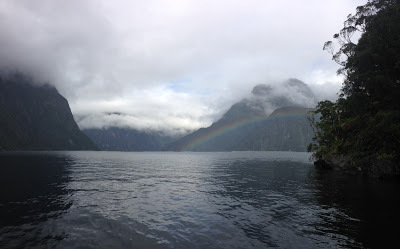 Milford Sound with rainbowWordcountz
Milford Sound with rainbowWordcountzI was going to do some graphs and trends-after-12-weeks stuff this time around, but I've got a bunch of other things to cover and post. So I'll leave the maths for another fortnight when I find myself less interesting.
As for fortnight #6, here it is, by the numbers:Total words for the fortnight: 7,395 words (cf 12k last fortnight)1st week: 3,955 / 2nd week: 3,44089.6% of these words were on the novel
Going to Fiordland for Easter took a chunk of time of out the end of week 1 and the start of week 2.
The plateau that I mentioned last fortnight persisted longer than I'd hoped (not so much in terms of total words, but how far into the story I managed to proceed). I resorted to alternative means of generating content (see cut-up chapter below), and managed to get something or somewhere.
With recent opportunities (see below), I'm still trying to figure out how much I try and get my location scout moving through time, or if I need to pull back and get things planned out better...
Travels (with Tomtit)
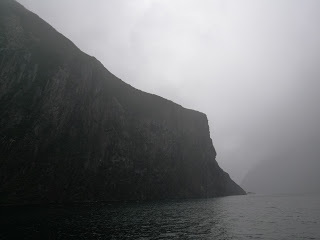 Misty ol' day in the Sound
Misty ol' day in the Sound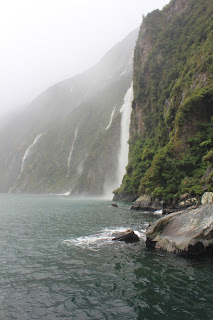 Waterfall with seals, Milford Sound
Waterfall with seals, Milford Sound
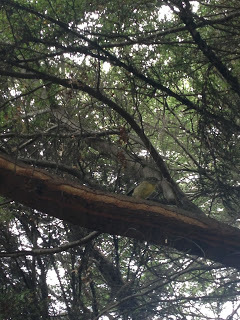 Tomtit
Tomtit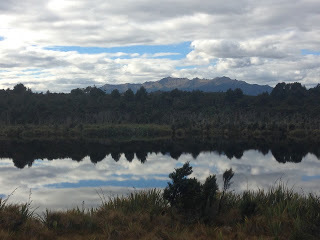 Lake Mistletoe
Lake Mistletoe
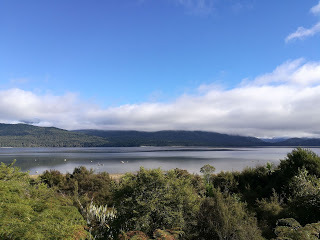 Lake Manapouri
Lake ManapouriMug
From Fortnight #1:
So I’m still using the dinky little Arcoroc cup I found in the dinky little kitchenette and having to make too many trips to make tea during my day and maybe I will end up ordering something in another moment of weakness.And so it came to pass.
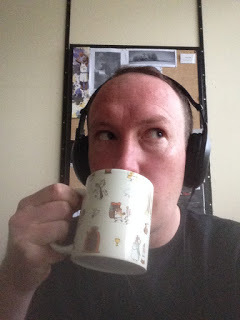
It depicts scenes from Monty Python's Holy Grail in a Saturday morning cartoon mode, which is kinda sorta exactly what my novel will turn out like if I'm not careful.
Outings
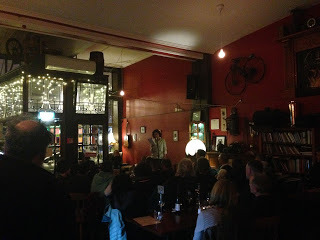
Octagon Poetry Collective
Last week I went to a reading at Dog With Two Tails. The feature poets were Sue Wootton (above) and Victor Billot. There was also an open mic for the collective members - it was an incredibly well oiled machine, each poet getting briskly to the mic, reading a single poem (some with patter, some without, but never more than necessary) and blending back into the crowd.
After an intermission, the chair came to me and lightly twisted my arm, so I read a poem ('Transition', with a rambling preamble that did not do justice to the preceding efficiency). While I've published quite a few poems, sporadically, I think the last time I read one of my poems in public was in 2006 at the Museum of City and Sea in Wellington.
It was a fun night and Sue and Victor were great too.
Town Belt Traverse
After going 11 years between public poetry readings, the next gap was five days. And instead of reading one poem, I had two and a half hours to fill!
The event was the annual Town Belt Traverse, organised by the Dunedin Amenities Society. As the Burns Fellow, I was positioned at the 5th and final station in Prospect Park and asked to "recite some verse" (people who talk about reciting and/or verse tend to think of poetry as they might dinosaurs or unicycling).
These first arrivals were the hardout walkers who hadn't really mucked around at any of the other stops and weren't going to lower their heartrate for a spot of poetry. Fair enough.
After about half an hour the stream of people became a bit more steady and in less of a rush, and I found my groove. People we much more comfortable stopping to listen if I was already reading, so it helped to have some longer pieces. (I learnt quickly that starting a poem as someone past made them feel as if they'd triggered a security light). In addition to about 20 poems of my own, I read some others' (Emma Neale, Geoff COchrane, Alice Oswald), and two short stories that are bitsy and poetic ('30 Ways of Looking at Marumaru South' and 'Parents in Decline').
I was joined in the middle span by one of the PhD candidates from the English Department who read Owen Marshall's 'The Divided World' (great choice) and two of my own poems (a weird experience). Thanks Damien!
Despite some awkward moments, I really enjoyed it at times, and had some good chats with people in between pieces.
The long and blinding road
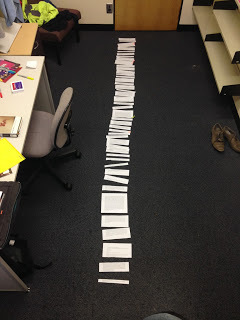 A selection of 40 or so fake quotes from my fake famous director
A selection of 40 or so fake quotes from my fake famous directorin the process of being ordered and rationalised before
being incorporated into the novelTBH there are times when working on a story or a novel when it can get scary.
Scary because suddenly what you are working on becomes clear and there’s a bigger meaning to it, or a bigger question underlying the work, that you didn't quite know was there when you started and are confronted with the task of being the one to see this through.
Am I really fit to be asking this question?
Can I really write a novel that dramatizes this particularly big thing that I didn’t know I was even grappling with until ninety seconds ago?
In time the feeling fades. You mock yourself for your self-importance. That's the only way you can proceed, or at least that I can.
One does not sit down each day and produce work of genius. One might come upon it, in the course of one's work, and if one is careful not to look directly into its eyes, might encircle it, once, twice, thrice, each revolution claiming a little more of its power for your own...
Or not. Probably not.
Internet Explorer
I mentioned last fortnight that I was spending a lot of time looking at places in Italy on Google Street View. At the risk of turning this place into selfie-central, I bought this t-shirt to embrace the desk-bound nature of my research/creativity.
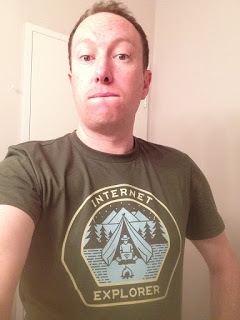
HOWEVER...
Things move quickly in these here parts.
Next month, I'm off to Italy and, after fulfilling some non-novelistic duties, I'll have the chance to 'scout' locations in person.
This is good news. Great news, even. Except, it does mean a lot of this next month is gonna be spent playing my own travel agent, trying to squeeze as much into my time on the ground, and preparing for the primary reason for my visit (education business).
A welcome spanner in the works.
Perhaps I need a new t-shirt?
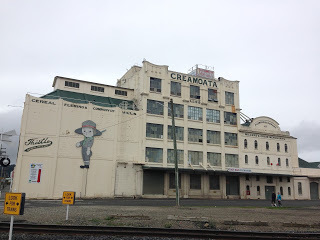 Is it wrong that I really, really like Gore?<!-- /* Font Definitions */ @font-face {font-family:"Cambria Math"; panose-1:2 4 5 3 5 4 6 3 2 4; mso-font-charset:0; mso-generic-font-family:auto; mso-font-pitch:variable; mso-font-signature:-536870145 1107305727 0 0 415 0;} @font-face {font-family:Calibri; panose-1:2 15 5 2 2 2 4 3 2 4; mso-font-charset:0; mso-generic-font-family:auto; mso-font-pitch:variable; mso-font-signature:-536870145 1073786111 1 0 415 0;} /* Style Definitions */ p.MsoNormal, li.MsoNormal, div.MsoNormal {mso-style-unhide:no; mso-style-qformat:yes; mso-style-parent:""; margin:0cm; margin-bottom:.0001pt; mso-pagination:widow-orphan; font-size:12.0pt; font-family:Calibri; mso-ascii-font-family:Calibri; mso-ascii-theme-font:minor-latin; mso-fareast-font-family:Calibri; mso-fareast-theme-font:minor-latin; mso-hansi-font-family:Calibri; mso-hansi-theme-font:minor-latin; mso-bidi-font-family:"Times New Roman"; mso-bidi-theme-font:minor-bidi; mso-fareast-language:EN-US;} .MsoChpDefault {mso-style-type:export-only; mso-default-props:yes; font-family:Calibri; mso-ascii-font-family:Calibri; mso-ascii-theme-font:minor-latin; mso-fareast-font-family:Calibri; mso-fareast-theme-font:minor-latin; mso-hansi-font-family:Calibri; mso-hansi-theme-font:minor-latin; mso-bidi-font-family:"Times New Roman"; mso-bidi-theme-font:minor-bidi; mso-fareast-language:EN-US;} @page WordSection1 {size:595.0pt 842.0pt; margin:72.0pt 72.0pt 72.0pt 72.0pt; mso-header-margin:35.4pt; mso-footer-margin:35.4pt; mso-paper-source:0;} div.WordSection1 {page:WordSection1;} </style> -->
Is it wrong that I really, really like Gore?<!-- /* Font Definitions */ @font-face {font-family:"Cambria Math"; panose-1:2 4 5 3 5 4 6 3 2 4; mso-font-charset:0; mso-generic-font-family:auto; mso-font-pitch:variable; mso-font-signature:-536870145 1107305727 0 0 415 0;} @font-face {font-family:Calibri; panose-1:2 15 5 2 2 2 4 3 2 4; mso-font-charset:0; mso-generic-font-family:auto; mso-font-pitch:variable; mso-font-signature:-536870145 1073786111 1 0 415 0;} /* Style Definitions */ p.MsoNormal, li.MsoNormal, div.MsoNormal {mso-style-unhide:no; mso-style-qformat:yes; mso-style-parent:""; margin:0cm; margin-bottom:.0001pt; mso-pagination:widow-orphan; font-size:12.0pt; font-family:Calibri; mso-ascii-font-family:Calibri; mso-ascii-theme-font:minor-latin; mso-fareast-font-family:Calibri; mso-fareast-theme-font:minor-latin; mso-hansi-font-family:Calibri; mso-hansi-theme-font:minor-latin; mso-bidi-font-family:"Times New Roman"; mso-bidi-theme-font:minor-bidi; mso-fareast-language:EN-US;} .MsoChpDefault {mso-style-type:export-only; mso-default-props:yes; font-family:Calibri; mso-ascii-font-family:Calibri; mso-ascii-theme-font:minor-latin; mso-fareast-font-family:Calibri; mso-fareast-theme-font:minor-latin; mso-hansi-font-family:Calibri; mso-hansi-theme-font:minor-latin; mso-bidi-font-family:"Times New Roman"; mso-bidi-theme-font:minor-bidi; mso-fareast-language:EN-US;} @page WordSection1 {size:595.0pt 842.0pt; margin:72.0pt 72.0pt 72.0pt 72.0pt; mso-header-margin:35.4pt; mso-footer-margin:35.4pt; mso-paper-source:0;} div.WordSection1 {page:WordSection1;} </style> -->
Published on April 24, 2017 01:34
April 11, 2017
We goin’ Sizzler: Fortnight #5 of the Burns
There is pleasure in the work
Words this fortnight: 12,320 (cf 8,702 the previous fortnight)Week 1 - 7,956Week 2 - 4,364
Still a case of the first week of the fortnight being the more productive (65 percent of the fortnightly tally this time) but not as pronounced as some previous fortnights.
Some blogging in week one distorts the figure, slightly. When looking just at what I added to THE LOCATION SCOUT, it's 5.4k vs 4k, figures I'll happily take for the next forty weeks, please and thank you.
I had two days of 2,000+ words twice this fortnight, one in each week (both Tuesdays). These were my first days over 2,000 (on just the novel) for the year.
I did strike a bit of a plateau with the manuscript around 18,000 words. It's the transition from the first act to the second, from what was known to what's much less fixed in my mind. So: a few days of casting around the internet, staring at Google Maps, watching YouTube videos, and then a bright idea in the shower and voila, someone has turned the word tap back on (just in time for another 2k Tuesday).
If there is no pleasure in the work / what chance have others of finding it?
There is pleasure in the work (x2)
The Dunedin Writers Festival programme is out and I'm appearing in two events:
* The End of the World (panel topic set before the subject of Eleanor Catton's next novel was announced)
* Found Poetry
It looks like it'll be a great few days in May, which is rapidly approaching.
In thinking about what I might do for the Found Poetry session, I've become VERY interested in Recurrent Neural Networks and their potential to generate text. I met with someone from the university's Computer Science faculty, who put me in touch with some of his colleagues. I'm working slowly towards a collaboration, though I'm not quite sure what the final product might be.
If there is no pleasure in the work, down tools
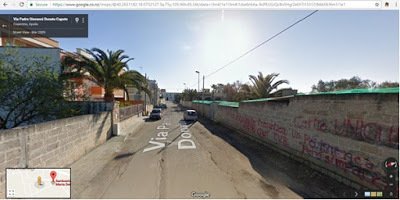
My location scout in THE LOCATION SCOUT has landed in Italy and is scouting locations I've never been to. It's an interesting experience, wedding imagination and Google Street View images. There's a chance I might be able to get to Italy before the book is finished, but I'm treating that as a nice bonus rather than a necessity. Believe it or not, the book's not really about location scouting!
So for now, the internet and I will suffice.
There is pleasure in the work (x2)
Me and my motley crew are off to Milford Sound and Te Anau for Easter. So expect next fortnight's update to be photo rich and wordcount poor.
There is pleasure in the work (fade out)
Words this fortnight: 12,320 (cf 8,702 the previous fortnight)Week 1 - 7,956Week 2 - 4,364
Still a case of the first week of the fortnight being the more productive (65 percent of the fortnightly tally this time) but not as pronounced as some previous fortnights.
Some blogging in week one distorts the figure, slightly. When looking just at what I added to THE LOCATION SCOUT, it's 5.4k vs 4k, figures I'll happily take for the next forty weeks, please and thank you.
I had two days of 2,000+ words twice this fortnight, one in each week (both Tuesdays). These were my first days over 2,000 (on just the novel) for the year.
I did strike a bit of a plateau with the manuscript around 18,000 words. It's the transition from the first act to the second, from what was known to what's much less fixed in my mind. So: a few days of casting around the internet, staring at Google Maps, watching YouTube videos, and then a bright idea in the shower and voila, someone has turned the word tap back on (just in time for another 2k Tuesday).
If there is no pleasure in the work / what chance have others of finding it?
Chilly bike ride this morning but the Royal Spoonbills were loving it on Anderson's Bay inlet. pic.twitter.com/qUTe9Ywdkz — Craig Cliff (@Craig_Cliff) April 3, 2017
There is pleasure in the work (x2)
The Dunedin Writers Festival programme is out and I'm appearing in two events:
* The End of the World (panel topic set before the subject of Eleanor Catton's next novel was announced)
* Found Poetry
It looks like it'll be a great few days in May, which is rapidly approaching.
In thinking about what I might do for the Found Poetry session, I've become VERY interested in Recurrent Neural Networks and their potential to generate text. I met with someone from the university's Computer Science faculty, who put me in touch with some of his colleagues. I'm working slowly towards a collaboration, though I'm not quite sure what the final product might be.
If there is no pleasure in the work, down tools

My location scout in THE LOCATION SCOUT has landed in Italy and is scouting locations I've never been to. It's an interesting experience, wedding imagination and Google Street View images. There's a chance I might be able to get to Italy before the book is finished, but I'm treating that as a nice bonus rather than a necessity. Believe it or not, the book's not really about location scouting!
So for now, the internet and I will suffice.
There is pleasure in the work (x2)
Me and my motley crew are off to Milford Sound and Te Anau for Easter. So expect next fortnight's update to be photo rich and wordcount poor.
There is pleasure in the work (fade out)
Published on April 11, 2017 01:42
March 31, 2017
March Consumption Diary
Music
Playlist
Concert
Nadia Reid at Port Chalmers Town Hall, 31 March
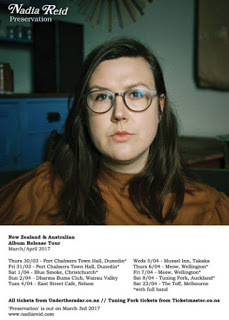 The second of two sold out shows in Reid's home town (don't get me started on how Dunedin's city boundary is insanely large, swallowing up towns like Port C and Mosgiel).
The second of two sold out shows in Reid's home town (don't get me started on how Dunedin's city boundary is insanely large, swallowing up towns like Port C and Mosgiel).
Wooden halls are notoriously difficult acoustically, especially with a full band, but the sound was pretty good. There were moments in almost every song where it was clear Reid - her talent - has this trajectory that few artists have.
One thing I noticed live that I hadn't noticed after hours listening to both her albums at home: every second song seems feature lyrics about direction, in particular forward movement. Overall, her lyrical palette is restrained, which is probably a good thing. And most lyricists have tics that become apparent after two-dozen or so songs. Will be interesting to see how, and where, her lyrics evolve in the future.
I won't go over the comparisons that I've seen in other places, but seeing her leading the rockier numbers I was put in mind of Niko Case when she fronts for the New Pornographers. Which is most certainly a good thing.
My favourite song at the moment is 'Richard', which has a very Kurt Vile groove, but there was something about Reid's voice that reminded me of something older. Last night I thought it might be Shawn Colvin's 'Sonny Came Home'. Listening to that song now, I'm not sure if that's the one.
Anyway!
Just a phenomenal talent and a bloody good night.
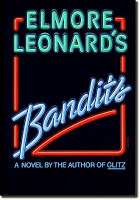 BooksBandits by Elmore Leonard (novel, audiobook)
BooksBandits by Elmore Leonard (novel, audiobook)
I find listening to a Leonard novel a useful reminder about the power of dialogue and the cancer that is disconnected exposition.
This one had some links to my work in progress (an ex-nun who kinda fell for St Francis of Asissi), but everything is connected, somehow. See Fortnight #4’s discussion of first draft solipsism.
The Man Who Could Fly: St Joseph of Copertino and the Mystery of Levitation by Michael Grosso (non-fiction)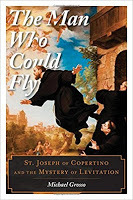
This book is clearly connected, no neurotism required. And it only came out last year, so after I did my initial deep dive of research. But I can imagine what writing my book would be like without reading this one.
That’s not to say it’s a good book. It’s really not. It’s often turgid, disjointed and uses logic selectively. And it took an age (2 months) to get through, despite being massively het up about the subject matter.
But it did give me something to argue against. And that, my friends, is a precious gift.
The Dreamer’s Dictionary – Stearn Robinson and Tom Corbett(non-fiction)
I was looking for a catalogue of common types of dreams (falling dreams, flying dreams, teeth falling out dreams) but this turned out to be a tool for those hoping to divine meaning from their dreams, as if they were tea leaves.
For example:
But I did like this, from the Introduction:
Universal Harvester by John Darnielle (novel, audiobook)
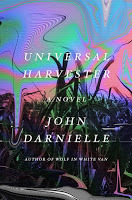 So, I loved Wolf in White Van, and I loved the first half of Universal Harvester. I mean, that title seems at once the most bad-ass Sabbath-era metal album title (Darnielle has also written a 33 1/3 book on Sabbath’s Master of Reality) and totally prosaic and farmy (the book is set in rural Iowa).
So, I loved Wolf in White Van, and I loved the first half of Universal Harvester. I mean, that title seems at once the most bad-ass Sabbath-era metal album title (Darnielle has also written a 33 1/3 book on Sabbath’s Master of Reality) and totally prosaic and farmy (the book is set in rural Iowa).
I normally listen to audiobooks on 1.25x or 1.5x, but early on in Universal Harvester I wanted to savour the experience. At a little over six hours normal speed, I felt the book (read by the author) was slipping away too fast.
The way horror (think: horror movies) and grief (think: lost parents) intersect, it’s really powerful. The novel has this genre-fied hot rod engine that is ready to take the reader anywhere, but then Darnielle chooses to keep it idling. Actually, he parks the hot rod out back and completely forgets about it for a while, and then, on the last page, when we’re all a bit tired and strung out and only a handful of us have any hope left, he runs to the hot rod, jumps in and goes for a very brief blat. But by then, it’s too little too late for most of us.
The Rosie Project by Graeme Simsion (novel, audiobook)
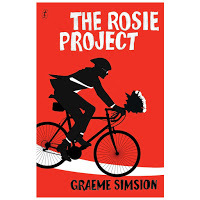 I wanted something light and commercial and I got it here.
I wanted something light and commercial and I got it here.
I’m totally not comfortable with the way this and many entertainments before it derive so much of the content from the comedy of the main character’s non-standard brain wiring (Don Tillman is somewhere on the ASD spectrum, but so are we all). At times it felt cheap, easy and/or untrue. Whenever Don’s wiring or the demands of the chick-lit genre come into conflict, the genre wins.
But still, I listened. Still, I lapped it up. Says something about my brain’s wiring I guess. Though I’m going to try hard to resist any urges to add any Helen Fielding to my Audible wishlist.
In My Father’s Den by Maurice Gee (novel, NZ, audiobook)
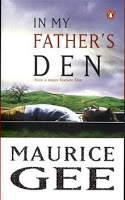 This was like the anti-Universal Harvester. I started listening to this novel on a day I worked from home (lawns to mow, washing to hang out, meals to cook) at 1.25x, but after a couple minutes felt comfortable cranking up to 1.5x. After an hour of biological time, I pumped it up to 1.75x and managed to finish the entire book in a day.
This was like the anti-Universal Harvester. I started listening to this novel on a day I worked from home (lawns to mow, washing to hang out, meals to cook) at 1.25x, but after a couple minutes felt comfortable cranking up to 1.5x. After an hour of biological time, I pumped it up to 1.75x and managed to finish the entire book in a day.
It’s been a number of years since I read Plumb, but I only read Rachel Barrowman’s biography of Gee last year. In My Father’s Den was like a mash-up of both of these (the autobiographical stuff about Henderson/Wellsford, the contrasting religiousness of Paul Prior’s parents) extruded through a classic crime novel (seventeen year old girl found dead in the scrub, half-scalped). But rather than conform to the crime genre, we get the story in a very NZ literary novel way: nothing procedural or quote-unquote pacy about this. The solution to the mystery is stumbled upon, rather quickly in the scheme of things, and resolved predictably enough (the climax does feature a tomahawk). While it might fail as a piece of genre fiction, it success as literature thanks in part to the momentum it borrows from genre. It doesn’t, unlike Darnielle’s book, park the crime story behind the shed and forget about it. It’s there, always, but Gee is able to buy enough time to give us the narrator’s entire life story, which, cunningly, allows the murderer’s motive to be neatly foregrounded without rousing the reader’s suspicion.
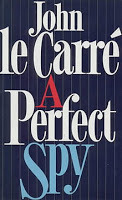 A Perfect Spy by John Le Carre (novel, audiobook)
A Perfect Spy by John Le Carre (novel, audiobook)
Another genre piece, this time from the master of the spy novel. I found this the hardest to manage as an audiobook. The genre demands the accumulation of significant detail, frequent reversals and assumed personas, and I found it hard to keep it all straight in my head. It wasn’t that it was all moving too fast for me (I found some parts went on too long), but that I couldn’t flip back a chapter or two to check things, such is the inexorable progress of an audiobook when you’re cycling, or hanging out the washing, or doing the groceries.
Film & TV(some of these I may have missed off my Jan/Feb list)
Do The Right ThingSex, Lies and VideotapeThe Legend of Bagger VanceRush: Beyond the Lighted Stage (My wife asked me why I liked watching documentaries about bands, as if this was something weird. My dad used to tape music docos from the TV. The Beatles. Pink Floyd. Beach Boys. So I grew up around not just this music, but people talking about the music, the making of the music. I'm interested in how any art is made, but music will always be the thing that is most immediate for me as an audience member, and the thing most distant from me in terms of talent. And I don't even like Rush, much. Like * sacrilege alert*: Neal Peart is not a good lyricist. Gimme 'Working Man' over anything Peart ever penned. But then, I didn't listen to Rush when I was going through puberty, so...)Grillo vs GrilloDave Chappelle Netlix specials (x2)I Don’t Feel At Home in this World AnymoreGreen RoomDemolition Man2 GunsEntourage: The movieTootsieThe Dead LandsJackie BrowneLove (Season 2)
Concert
Nadia Reid at Port Chalmers Town Hall, 31 March
 The second of two sold out shows in Reid's home town (don't get me started on how Dunedin's city boundary is insanely large, swallowing up towns like Port C and Mosgiel).
The second of two sold out shows in Reid's home town (don't get me started on how Dunedin's city boundary is insanely large, swallowing up towns like Port C and Mosgiel).Wooden halls are notoriously difficult acoustically, especially with a full band, but the sound was pretty good. There were moments in almost every song where it was clear Reid - her talent - has this trajectory that few artists have.
One thing I noticed live that I hadn't noticed after hours listening to both her albums at home: every second song seems feature lyrics about direction, in particular forward movement. Overall, her lyrical palette is restrained, which is probably a good thing. And most lyricists have tics that become apparent after two-dozen or so songs. Will be interesting to see how, and where, her lyrics evolve in the future.
I won't go over the comparisons that I've seen in other places, but seeing her leading the rockier numbers I was put in mind of Niko Case when she fronts for the New Pornographers. Which is most certainly a good thing.
My favourite song at the moment is 'Richard', which has a very Kurt Vile groove, but there was something about Reid's voice that reminded me of something older. Last night I thought it might be Shawn Colvin's 'Sonny Came Home'. Listening to that song now, I'm not sure if that's the one.
Anyway!
Just a phenomenal talent and a bloody good night.
 BooksBandits by Elmore Leonard (novel, audiobook)
BooksBandits by Elmore Leonard (novel, audiobook)I find listening to a Leonard novel a useful reminder about the power of dialogue and the cancer that is disconnected exposition.
This one had some links to my work in progress (an ex-nun who kinda fell for St Francis of Asissi), but everything is connected, somehow. See Fortnight #4’s discussion of first draft solipsism.
The Man Who Could Fly: St Joseph of Copertino and the Mystery of Levitation by Michael Grosso (non-fiction)

This book is clearly connected, no neurotism required. And it only came out last year, so after I did my initial deep dive of research. But I can imagine what writing my book would be like without reading this one.
That’s not to say it’s a good book. It’s really not. It’s often turgid, disjointed and uses logic selectively. And it took an age (2 months) to get through, despite being massively het up about the subject matter.
But it did give me something to argue against. And that, my friends, is a precious gift.
The Dreamer’s Dictionary – Stearn Robinson and Tom Corbett(non-fiction)
I was looking for a catalogue of common types of dreams (falling dreams, flying dreams, teeth falling out dreams) but this turned out to be a tool for those hoping to divine meaning from their dreams, as if they were tea leaves.
For example:
Halo. To see someone wearing a halo in your dreams indicates sad news; if you were wearing the halo, it predicts travel; if you dreamed of taking off a halo you can expect some kind of improvement in business or financial matters.Bah!
But I did like this, from the Introduction:
…as dreams allow one to go safely and quietly insane for a time each day, it is not, as heretofore believed, the sleep that is necessary for our well-being, but the dreams.
Universal Harvester by John Darnielle (novel, audiobook)
 So, I loved Wolf in White Van, and I loved the first half of Universal Harvester. I mean, that title seems at once the most bad-ass Sabbath-era metal album title (Darnielle has also written a 33 1/3 book on Sabbath’s Master of Reality) and totally prosaic and farmy (the book is set in rural Iowa).
So, I loved Wolf in White Van, and I loved the first half of Universal Harvester. I mean, that title seems at once the most bad-ass Sabbath-era metal album title (Darnielle has also written a 33 1/3 book on Sabbath’s Master of Reality) and totally prosaic and farmy (the book is set in rural Iowa). I normally listen to audiobooks on 1.25x or 1.5x, but early on in Universal Harvester I wanted to savour the experience. At a little over six hours normal speed, I felt the book (read by the author) was slipping away too fast.
The way horror (think: horror movies) and grief (think: lost parents) intersect, it’s really powerful. The novel has this genre-fied hot rod engine that is ready to take the reader anywhere, but then Darnielle chooses to keep it idling. Actually, he parks the hot rod out back and completely forgets about it for a while, and then, on the last page, when we’re all a bit tired and strung out and only a handful of us have any hope left, he runs to the hot rod, jumps in and goes for a very brief blat. But by then, it’s too little too late for most of us.
The Rosie Project by Graeme Simsion (novel, audiobook)
 I wanted something light and commercial and I got it here.
I wanted something light and commercial and I got it here.I’m totally not comfortable with the way this and many entertainments before it derive so much of the content from the comedy of the main character’s non-standard brain wiring (Don Tillman is somewhere on the ASD spectrum, but so are we all). At times it felt cheap, easy and/or untrue. Whenever Don’s wiring or the demands of the chick-lit genre come into conflict, the genre wins.
But still, I listened. Still, I lapped it up. Says something about my brain’s wiring I guess. Though I’m going to try hard to resist any urges to add any Helen Fielding to my Audible wishlist.
In My Father’s Den by Maurice Gee (novel, NZ, audiobook)
 This was like the anti-Universal Harvester. I started listening to this novel on a day I worked from home (lawns to mow, washing to hang out, meals to cook) at 1.25x, but after a couple minutes felt comfortable cranking up to 1.5x. After an hour of biological time, I pumped it up to 1.75x and managed to finish the entire book in a day.
This was like the anti-Universal Harvester. I started listening to this novel on a day I worked from home (lawns to mow, washing to hang out, meals to cook) at 1.25x, but after a couple minutes felt comfortable cranking up to 1.5x. After an hour of biological time, I pumped it up to 1.75x and managed to finish the entire book in a day.It’s been a number of years since I read Plumb, but I only read Rachel Barrowman’s biography of Gee last year. In My Father’s Den was like a mash-up of both of these (the autobiographical stuff about Henderson/Wellsford, the contrasting religiousness of Paul Prior’s parents) extruded through a classic crime novel (seventeen year old girl found dead in the scrub, half-scalped). But rather than conform to the crime genre, we get the story in a very NZ literary novel way: nothing procedural or quote-unquote pacy about this. The solution to the mystery is stumbled upon, rather quickly in the scheme of things, and resolved predictably enough (the climax does feature a tomahawk). While it might fail as a piece of genre fiction, it success as literature thanks in part to the momentum it borrows from genre. It doesn’t, unlike Darnielle’s book, park the crime story behind the shed and forget about it. It’s there, always, but Gee is able to buy enough time to give us the narrator’s entire life story, which, cunningly, allows the murderer’s motive to be neatly foregrounded without rousing the reader’s suspicion.
 A Perfect Spy by John Le Carre (novel, audiobook)
A Perfect Spy by John Le Carre (novel, audiobook)Another genre piece, this time from the master of the spy novel. I found this the hardest to manage as an audiobook. The genre demands the accumulation of significant detail, frequent reversals and assumed personas, and I found it hard to keep it all straight in my head. It wasn’t that it was all moving too fast for me (I found some parts went on too long), but that I couldn’t flip back a chapter or two to check things, such is the inexorable progress of an audiobook when you’re cycling, or hanging out the washing, or doing the groceries.
Film & TV(some of these I may have missed off my Jan/Feb list)
Do The Right ThingSex, Lies and VideotapeThe Legend of Bagger VanceRush: Beyond the Lighted Stage (My wife asked me why I liked watching documentaries about bands, as if this was something weird. My dad used to tape music docos from the TV. The Beatles. Pink Floyd. Beach Boys. So I grew up around not just this music, but people talking about the music, the making of the music. I'm interested in how any art is made, but music will always be the thing that is most immediate for me as an audience member, and the thing most distant from me in terms of talent. And I don't even like Rush, much. Like * sacrilege alert*: Neal Peart is not a good lyricist. Gimme 'Working Man' over anything Peart ever penned. But then, I didn't listen to Rush when I was going through puberty, so...)Grillo vs GrilloDave Chappelle Netlix specials (x2)I Don’t Feel At Home in this World AnymoreGreen RoomDemolition Man2 GunsEntourage: The movieTootsieThe Dead LandsJackie BrowneLove (Season 2)
Published on March 31, 2017 14:51
March 27, 2017
Scorched Earth - Fortnight #4 of the Burns
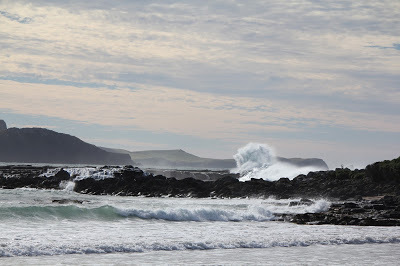 Waves, The CatlinsOne: Status report (textual/confessional)
Waves, The CatlinsOne: Status report (textual/confessional)How do I feel about my novel after four weeks of solid work (and a good 18 months of sitting on the first 7,000 words and all the research that went into getting that far)?
Well, I'm not glad you asked, but I'll try and answer anyway. I feel pleased to be where I am (actually working on it! Go the Burns!), but the novel itself, the 30-odd pages it comprises right now, it feels flabby. That's okay, I guess. I can put it on the treadmill once the first draft is done and I know what's really important. But I have to get to the end (the first end of many).
One problem is I think this flabbiness might be part of what I'm going for, in this first section at least. The risk of doing a book about people who make art (in this case: film) that you expect the reader to take seriously, and also bringing in historical and religious aspects, is that it gets very po-faced, very quickly. So my protagonist is actually a bit of a fuck-up, and we meet him in the midst of this moment in his life that feels more like a Judd Apatow movie than something slicker and smarter. And Apatow's stuff is all pretty flabby. It must be part of the formula. The way recipes require a certain amount of fat for flavour. But I'm still figuring out how this works on the page within my particular concoction.
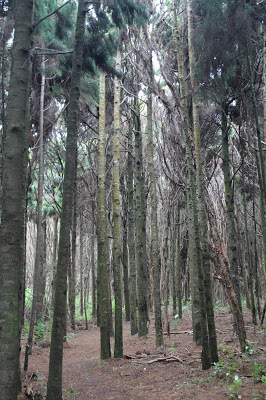 Forest walk back from Curio BayThe other problem is I feel as if everything I read or watch is somehow talking to me, talking to the novel, and needs, needs, to find its way onto the page. (Look out for my March Consumption Diary toward the end of the week if you want to read between the lines a little further).
Forest walk back from Curio BayThe other problem is I feel as if everything I read or watch is somehow talking to me, talking to the novel, and needs, needs, to find its way onto the page. (Look out for my March Consumption Diary toward the end of the week if you want to read between the lines a little further).It’s not a new experience. Call it extreme narcissim or first draft solipsism. It's happened before and it'll happen again. I know it passes. I
The task is to:
a) resist the urges in the first instance
b) expunge the extraneous material that makes it through the first line of defense in my daily read-throughs
c) expunge the persistent extraneous elements in intensive edit of 1st draft
d) repeat c) for 2nd draft, rinse and repeat until deadline has passed and you throw up your hands and say, I’m done.
Knowing this, I’m able to keep perspective.
I’m able to be genuinely happy with making my manuscript grow by 1,000 words a day for a string of days, even if I know the net remnants of that week may be far far smaller when the book is finished.
Or, shock horror, that this thing about a bit of Apatovian flab being necessary is a massive error of judgement and the first 30 pages wind up on the cutting room floor.
Oh well. It’s part of the process.
Truth is, I love editing the most. It’s easy to see the book getting better, hour by hour. But you gotta have something to edit. And gosh, weeks like the one before the Catlins will get you there (see part 3 below).
And the Catlins trip was work related, too...
Two: Catlins teaser
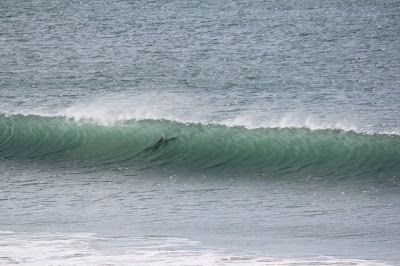 Hector's dolphin inside a wave at Porpoise Bay
Hector's dolphin inside a wave at Porpoise BayThree: Status Report (numerical)
Total words: 8,702 (novel 7,450; blog 1,092; poetry 141)
* Week 1: 6992 (with an average of 1,180 on the novel Monday to Friday)
* Week 2: 1,710 total.
Why the massive drop-off?
On Saturday of Week 1 we headed down to a house in Waikawa in the Catlins, and got back in Dunedin late on Tuesday, by which time me and my son were starting to feel sick. Wednesday we both were write-offs. I improved, but stayed home Thursday and Friday as Caio was still not up to going back to daycare (double ear infection, fever, general clinginess, a touch of conjuctivitis... y'know how it is).
Four: But the Catlins!
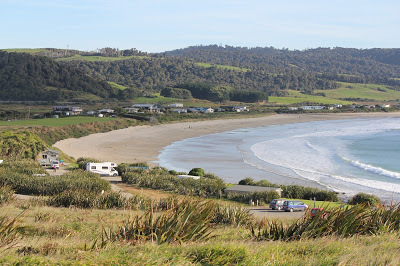 The view of Porpoise Bay from the Curio Bay campground
The view of Porpoise Bay from the Curio Bay campground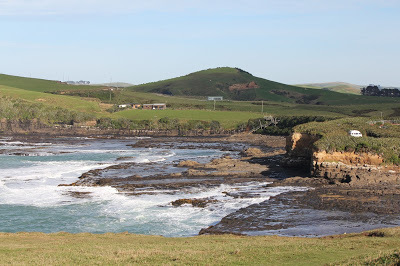 Looking at Curio Bay and it's petrified forest (partially submerged) from the campground
Looking at Curio Bay and it's petrified forest (partially submerged) from the campground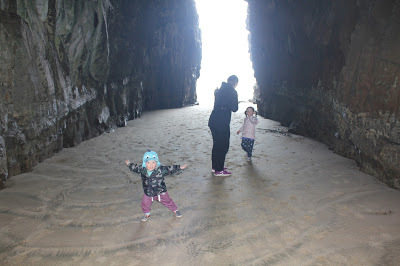 My son learnt to photo-bomb at Cathedral Caves, bless him
My son learnt to photo-bomb at Cathedral Caves, bless himFive: Birds and Boatmen
Apart from seeing the Hector's dolphins cosying up to swimmers at Porpoise Bay, the other notable wildlife sighting was my first Tomtit (actually, multiple) on the 30 minute walk (perfect for with the kids at Waipohatu. I didn't take photos as I had Caio on my shoulders and my camera was in my backpack both times, but I'm sure there'll be other encounters with the South Island's version of the robin over the next 10 months, so you'll live.
Also of note, the Waikawa Museum, with it's trove of family photos and trinkets. All its signs and captions are handwritten - which is both charming and somehow depressing, as if this history is less permanent, less valued, will have a shorter shelf life. I dunno. There was a sign saying don't take photos (not sure I understand the motivation), but I had to take a snap of this father and son (Captain Wybrow and his son David) and the wooden grave marker for Wybrow's wife Temuka (Temuc according to the engraving).
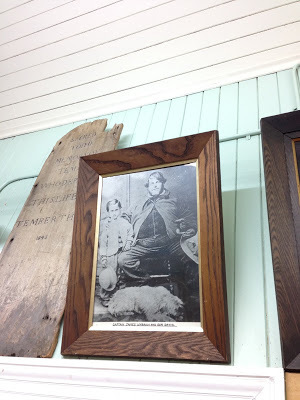
There's lots I could write about these things, and one day I might.
Six: Interlude
Sitting and writing means I eat a lot. I must have some kind of oral fixation. Maybe it’s like ACHOO syndrome, where sudden increase in brightness makes me sneeze. Maybe making shit up makes me hungry?
Maybe I should try gum.
Seven: But was it research for the current novel?
Yes! My trip to the Catlins was fruitful. I'd been casting around, trying to come up with an idea for a low budget NZ film my main character could have made that kinda kickstarted his career, got him on the festival circuit, before it all goes pear-shaped.
I'd had this image of a Western set in the Kaimanawa Ranges, a kind of adaptation of Nigel Cox's Cowboy Dog, but there was a film that was actually made like this (Good for Nothing, filmed in NZ though purporting to be the US) a couple of years ago, so I felt I needed to come up with something else.
So I did. Hoorah.
What's the idea? I can't tell you. But the (imaginary) film is called Curio Bay, at least for now.
Eight: Dunedin institutions
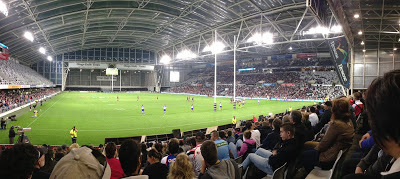
I went to Forsyth Barr stadium for the first time Friday before last. It was for a Warriors game, rather than the Highlanders, because I'm dumb enough to actually support the Warriors. What a bunch of schmucks. But an interesting stadium and an interesting crowd.
This Friday, I'm off to see Nadia Reid at the Port Chalmers Town Hall, which should be cool on many levels.
Published on March 27, 2017 01:29
March 13, 2017
Fire at will - Burns Fortnight #3
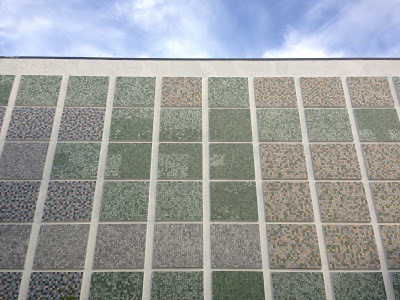 Detail, Otago Muslim Association, Clyde Street
Detail, Otago Muslim Association, Clyde Street1. Fellows Welcome
This fortnight started hospitably, with an event at the Hocken Library to welcome the University of Otago's five Arts Fellows (visual arts, dance, music, children's writing and, uh, just writing).
Here's the write-up from the Uni's website.
As you can see from the pic attached to that write-up, it was a gloriously sunny late afternoon (last fortnight's good weather stuck around for another week). It was nice that my wife and kids got to come along for the first bit (before bedtime beckoned).
When the Pro Vice Chancellor was reading out the bios of the Fellows, my daughter, Lia (4), turned to me and said, excitedly, "That's you!". But I was quickly forgotten when the bio of the dance fellow was read out. "Ballet! Daddy, he said ballet!"
When it came time for the Fellows to say a few words in response, my wife had to disappear with my son for what turned out to be a toilet false alarm, so I ended up going on stage with Lia. She casually held my hand the whole time and declined the opportunity to say anything, so I thanked the people of Dunedin and the university on behalf of the both of us.
2. Productivity (& spectatorship)
Total words this fortnight: 9,121 (4,896 on THE LOCATION SCOUT, the rest on this blog)
It was a fortnight of two halves again. The first week was solid. I felt comfortable with where I'd gotten my short stories, and was itching to start my novel before February was over, so I started (techincally restarted, after last working on it in earnest in 2015) a day early.
The next four days I made good progress, averaging an additional 933 words to the manuscript per day. That's passable for any point in the novel, but pretty darn good for the first ten or so pages. This reflects the fact I had a fairly decent (7,000 words) false start behind me, and 18+ months to mull over what wasn't quite right. Oh, and in the last week of Feb I had story-boarded out the first three scenes/chapters. So, really, why shouldn't I be productive?
Then came the weekend, and my brother came down from Wellington, so I had to show him around and generally have a great time. See part 3.
Later in the week, I tried in vain to resist the combination of sunshine and test cricket occurring a 5-minute bike ride from my office. So productivity suffered. But, as I told my wife, watching test cricket by yourself is great thinking time. I think it set me up pretty well for fortnight #4 (at least the first week... I sure hope this won't be a pattern!).
I'm off to the Warriors vs the Bulldogs at the stadium this Friday. Probably won't be as much deep thinking going on there!
3. Tourism
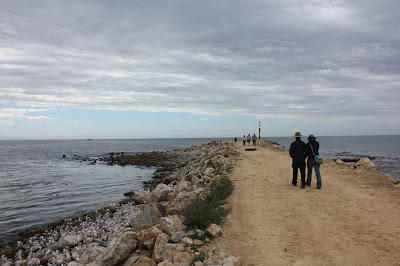 The Mole at Aramoana (the black line across the path is a fur seal)
The Mole at Aramoana (the black line across the path is a fur seal)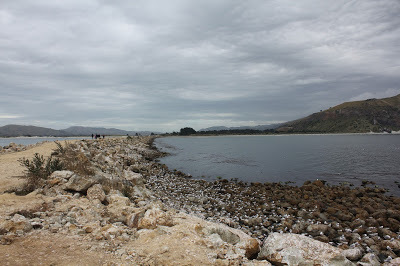 Looking back from the end of The Mole, with terns and gulls
Looking back from the end of The Mole, with terns and gulls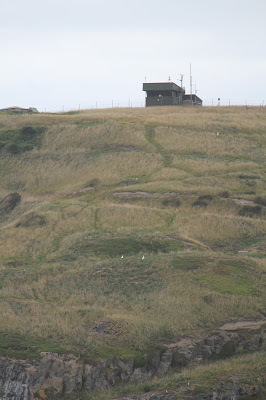 White dots = albatross (including parent with chick if you zoom into the 'dot' that's just right of centre),
White dots = albatross (including parent with chick if you zoom into the 'dot' that's just right of centre),Harrington Point viewed from the end of The Mole at Aramoana
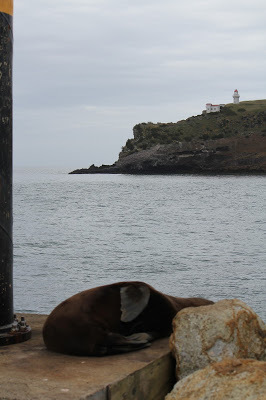 Fur seal and Harrington Pt Lighthouse
Fur seal and Harrington Pt Lighthouse The view from Signal Hill
The view from Signal Hill Snack at St Kilda Beach
Snack at St Kilda Beach4. M.O.R.
Something that happened in Fortnight #3, but I only properly reflected on afterwards:
People talk about two Dunedins. The students and the locals. Or maybe it's Dunedin during term time and Dunedin during the holidays.
Before Orientation started, I felt young. As in: below the median age in town.
After Orientation: way old.
That influx of 20,000 18 year olds (okay, they aren't all that young, but...) sure is noticeable. Of course, working (I'm trying hard to leave off the inverted commas) at the university means I'm at Ground Zero for the change.
What influence will being around so many people born when the Y2K bug was a thing to fear have on my writing / me? These young people fall into my generational blindspot - too young to be siblings or cousins (or direct reports, just yet), too old to be kids of mine or my peers. What interaction will I really have with them, beyond reading Critic and trying not to run over them on my bicycle?
Time will tell.
5. Open to the universe
One good thing about having had some halfway decent productivity to start my fellowship is that I feel I can start to say YES to things that pop up.
Event formation seems to be quite organic down here. At the Fellows Welcome I was asked if I want to take part in three separate things (a theatre thing, a library thing, a creative writing thing). No firm dates. No firm anything, really, but I said Yes, because that's part of why I'm down here.
(I also found out one of the University's leadership team is reading my blog - though maybe he was just cyber stalking me in the lead up to the Welcome and will stop now - and got invited up the clock tower in the iconic admin building. I said something about that being a great setting for a murder mystery. Who killed the Vice Chancellor? Quick, barricade the stairwell. Now I'm not sure if that invite still stands.)
Doing a stonking job with a novel manuscript is my primary objective, but doing things that make me feel like a writer again (or, heaven forbid, a thinker) should help with the novel and life beyond it. Because, hard as it is to conceive of right now, there will come a time when I need to move on to other projects. If I keep adding to the reservoir this year, I should be spoiled for choice in 2018 or 2019 or whenever I finally put THE LOCATION SCOUT to bed.
Since the Fellows Welcome, I've said yes to two events for the Dunedin Writers Festival in May, and another thing for the Dunedin Amenities Society. (Next fortnight I might share with you my theory about why it's better to live in a town that's seen better days than one that's still growing, but suffice to say one reason is things like Town Belts and Amenities Societies exist)
I still feel like I have capacity for more. In fact, I have an idea for something that I'll probably need to drive if it's to become a reality.
And I like surprises. So hit me up, universe.
Published on March 13, 2017 19:55



